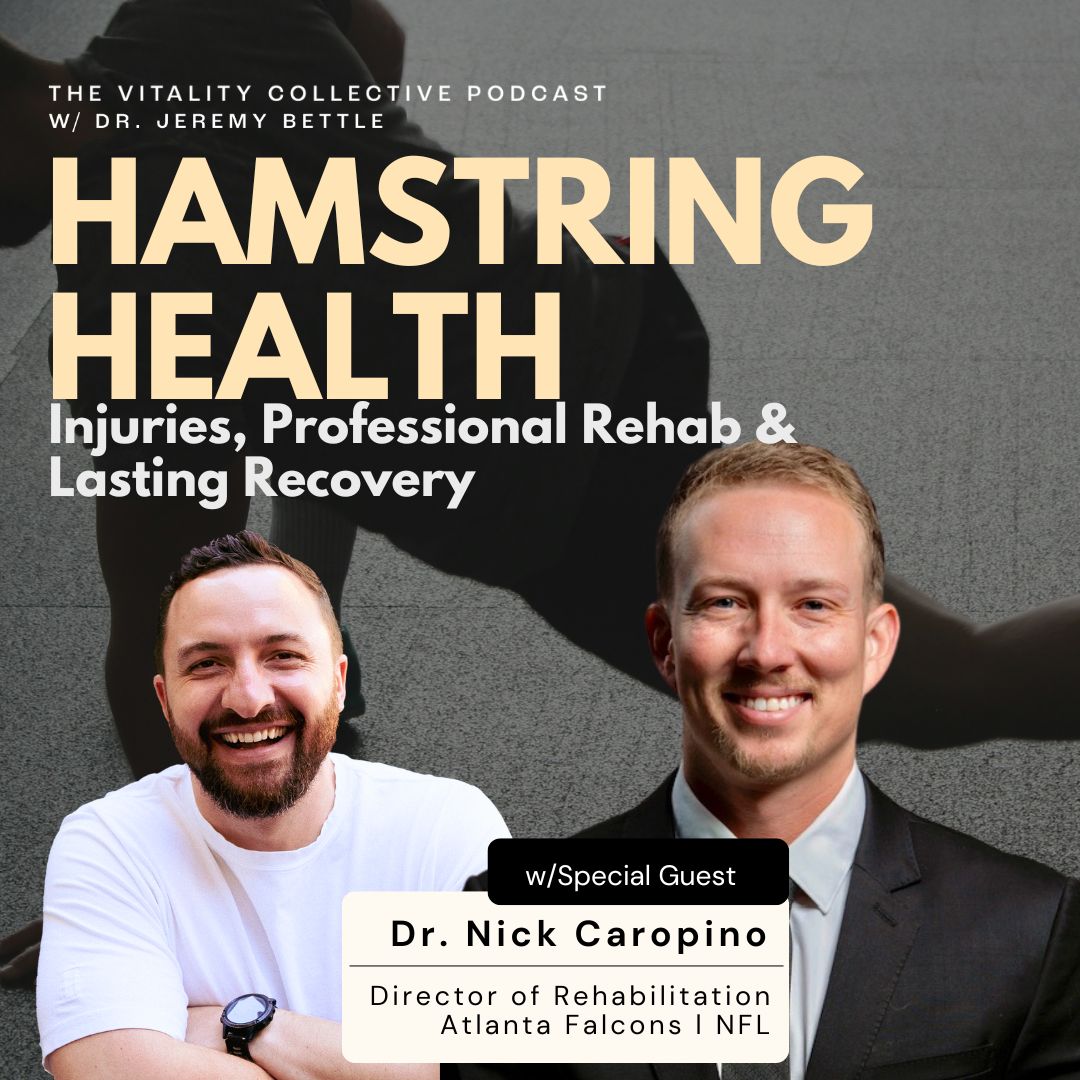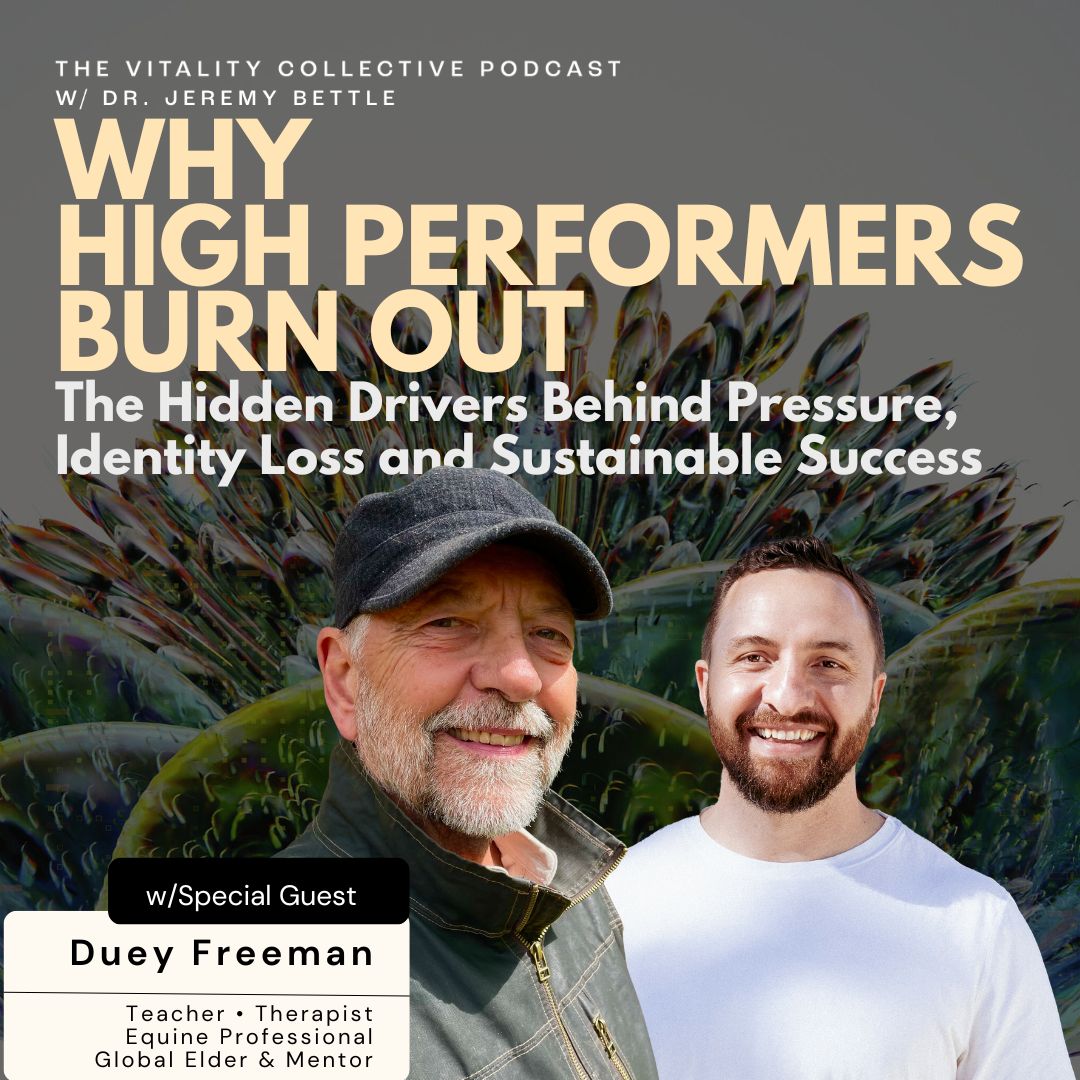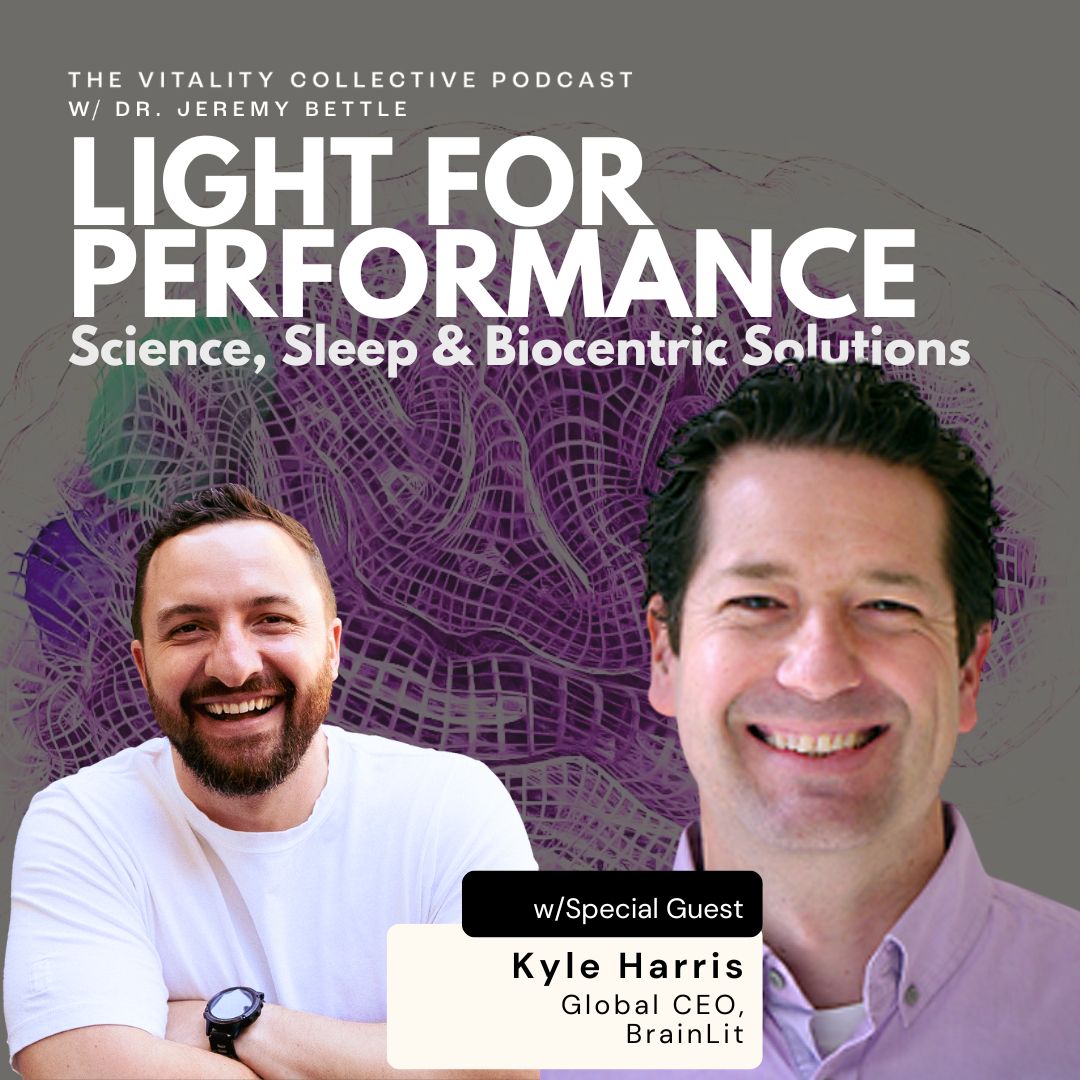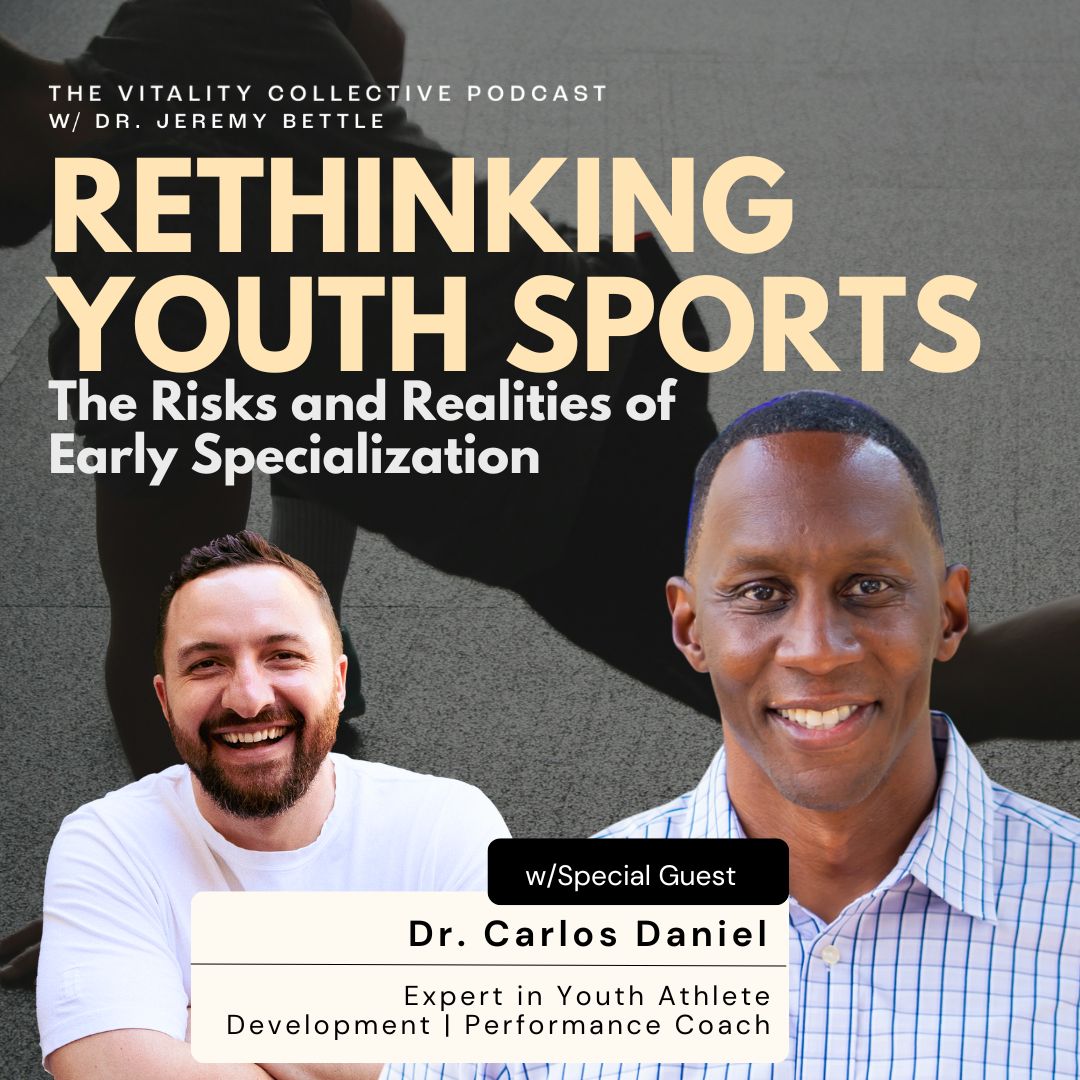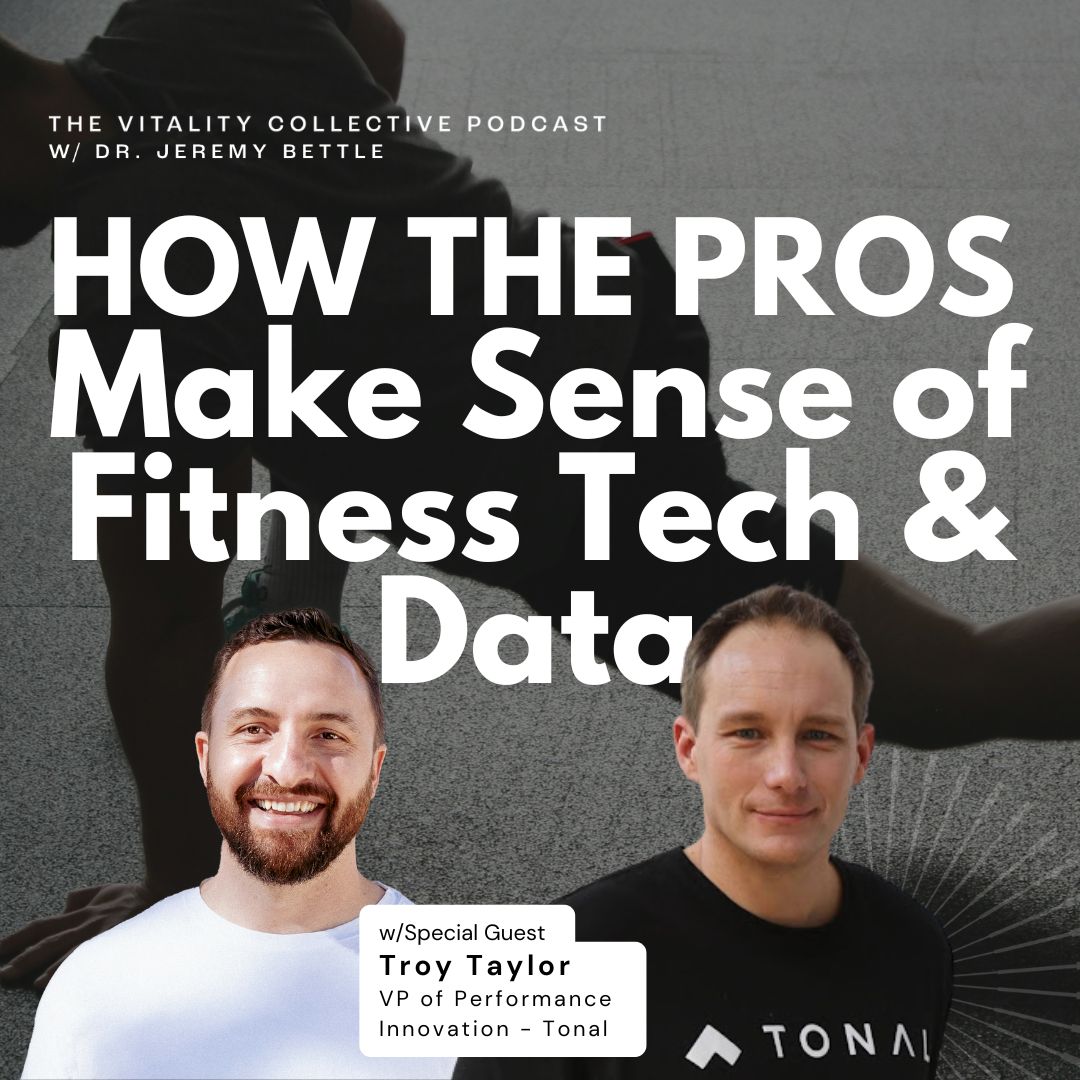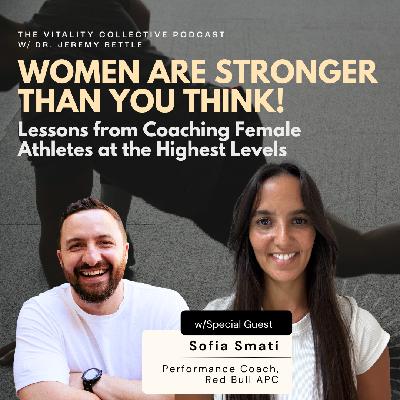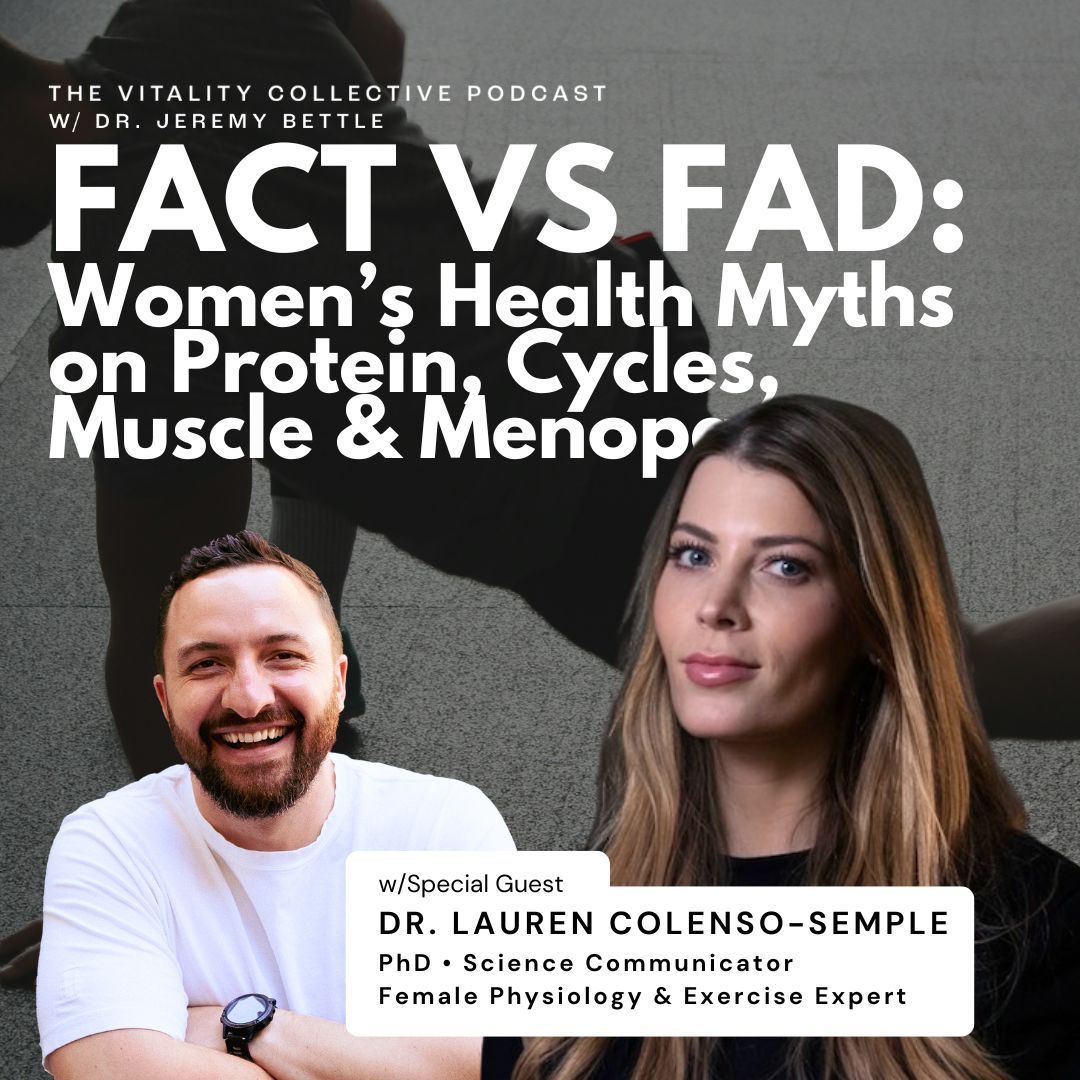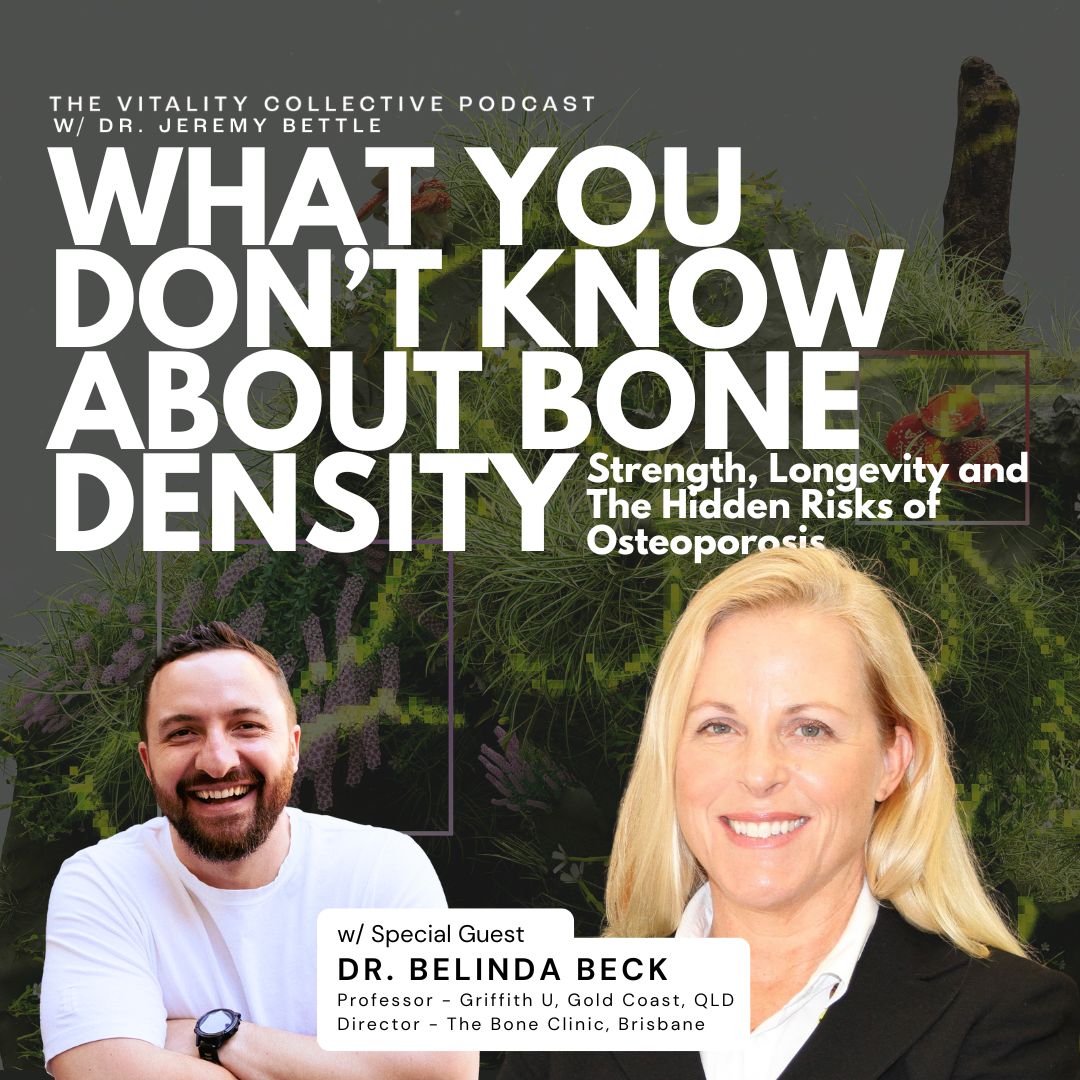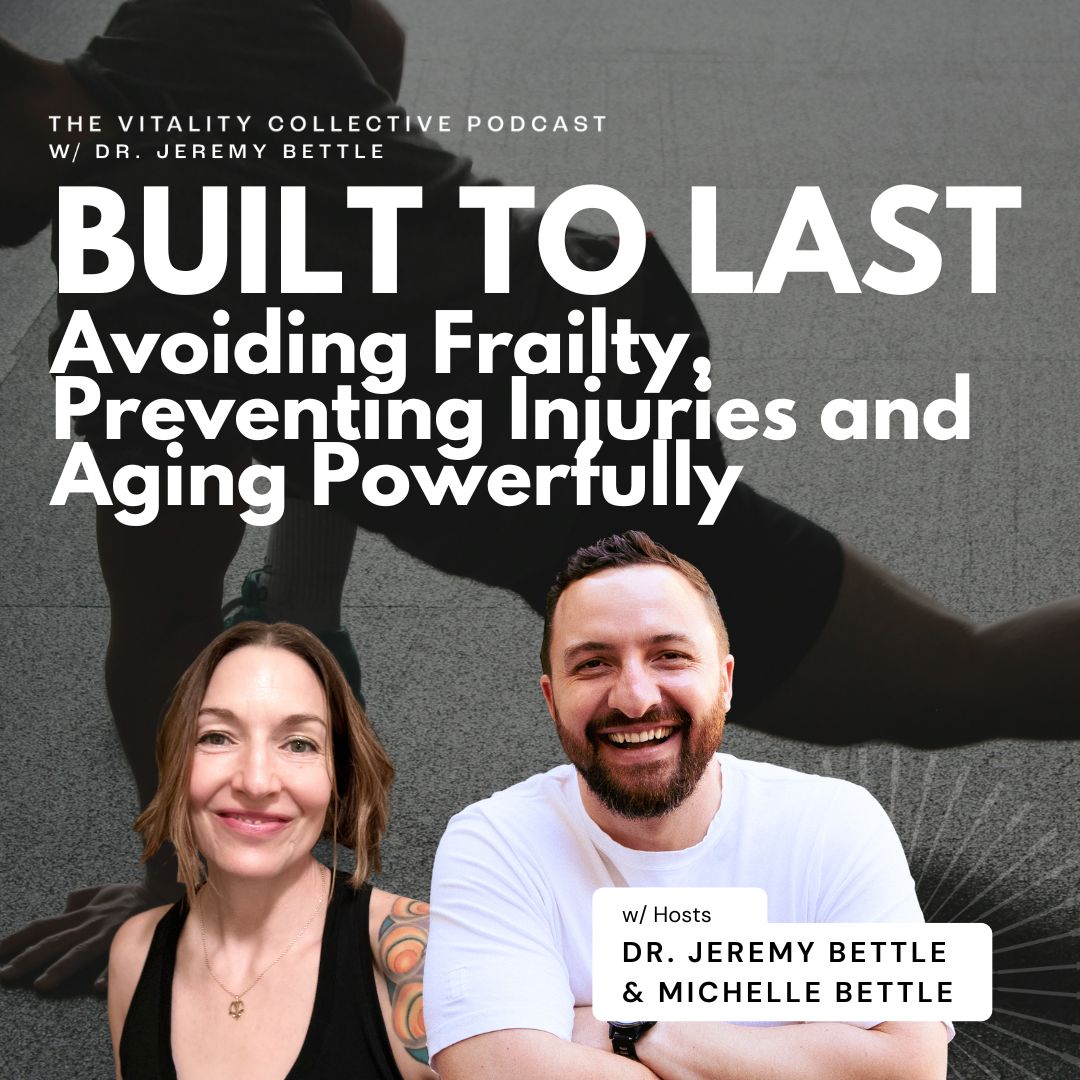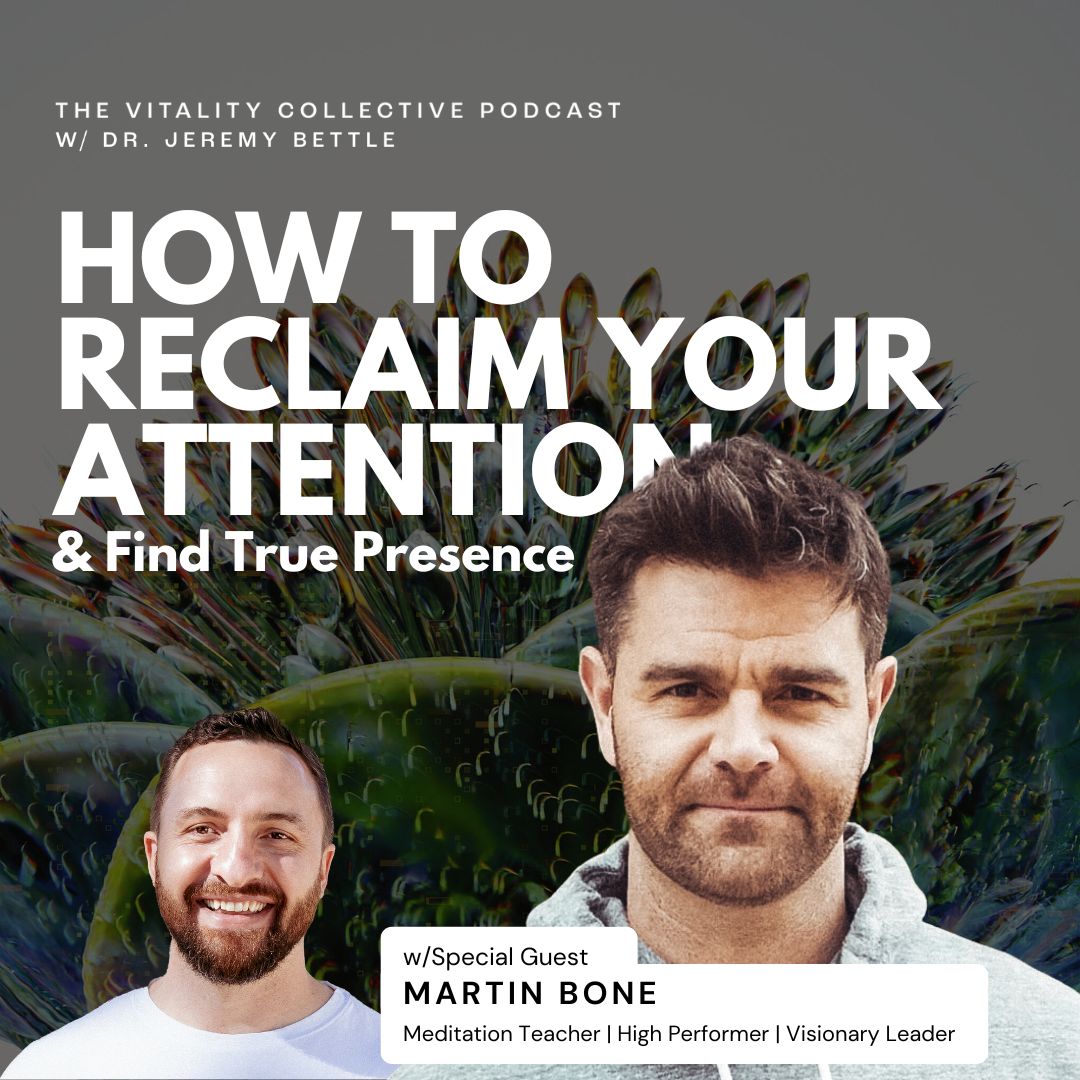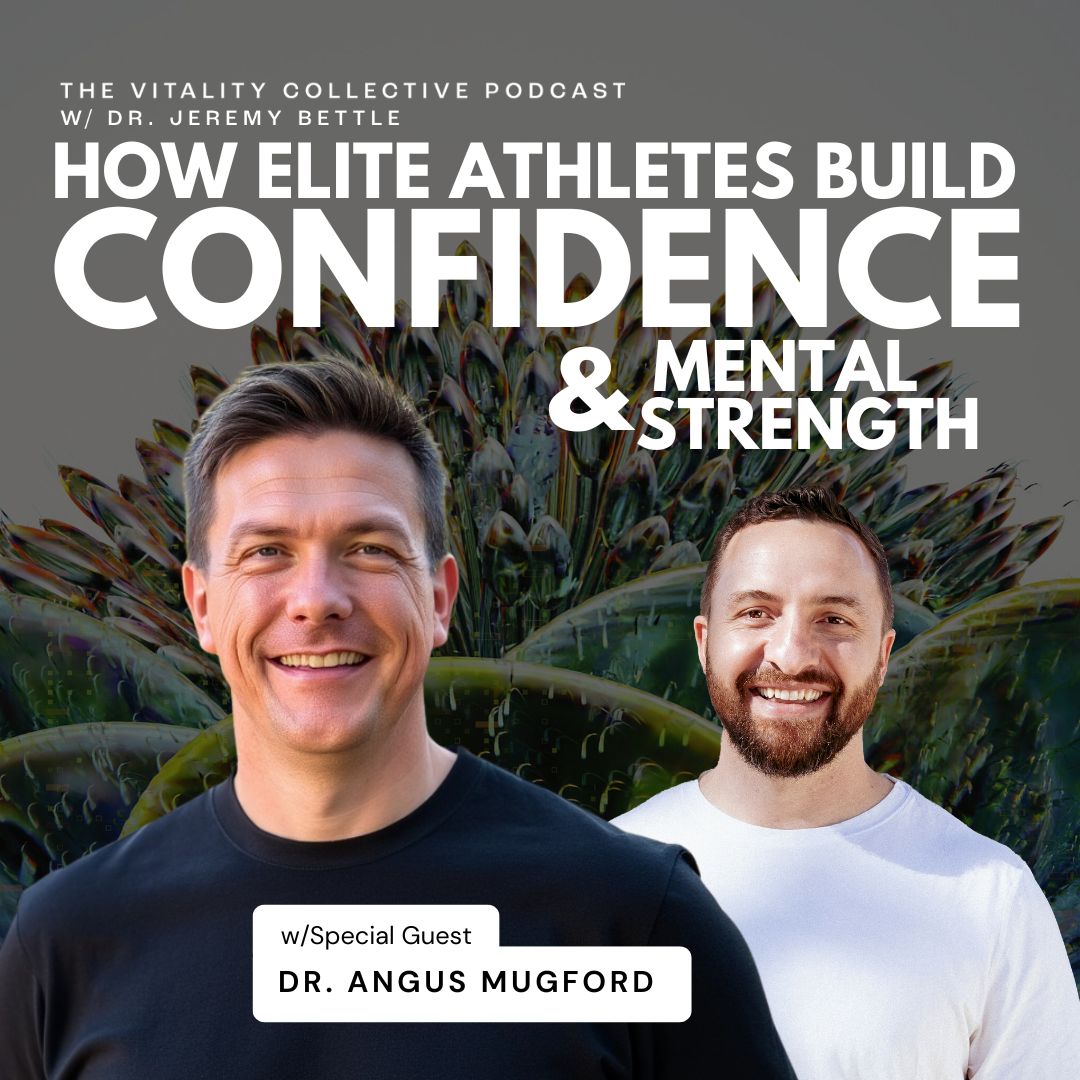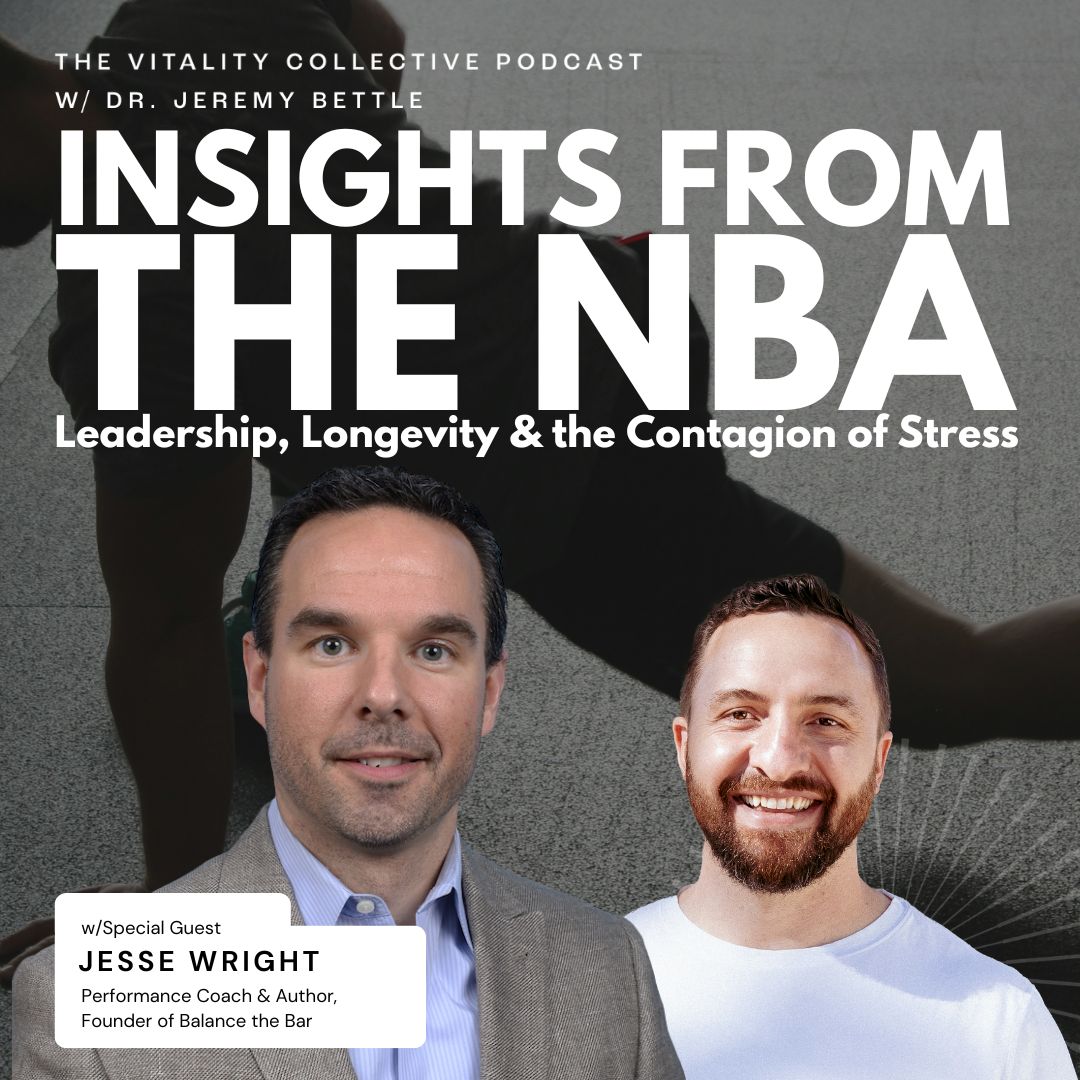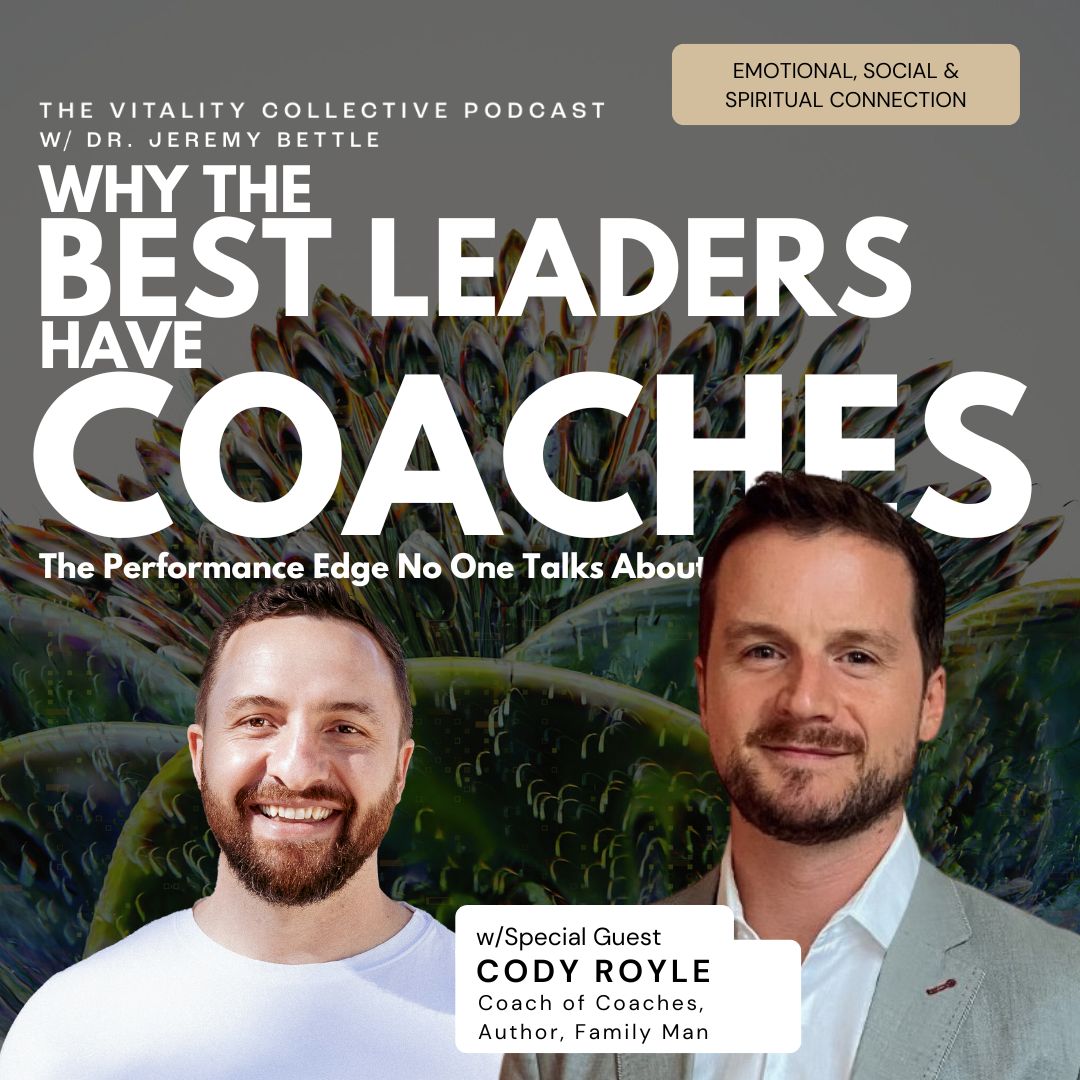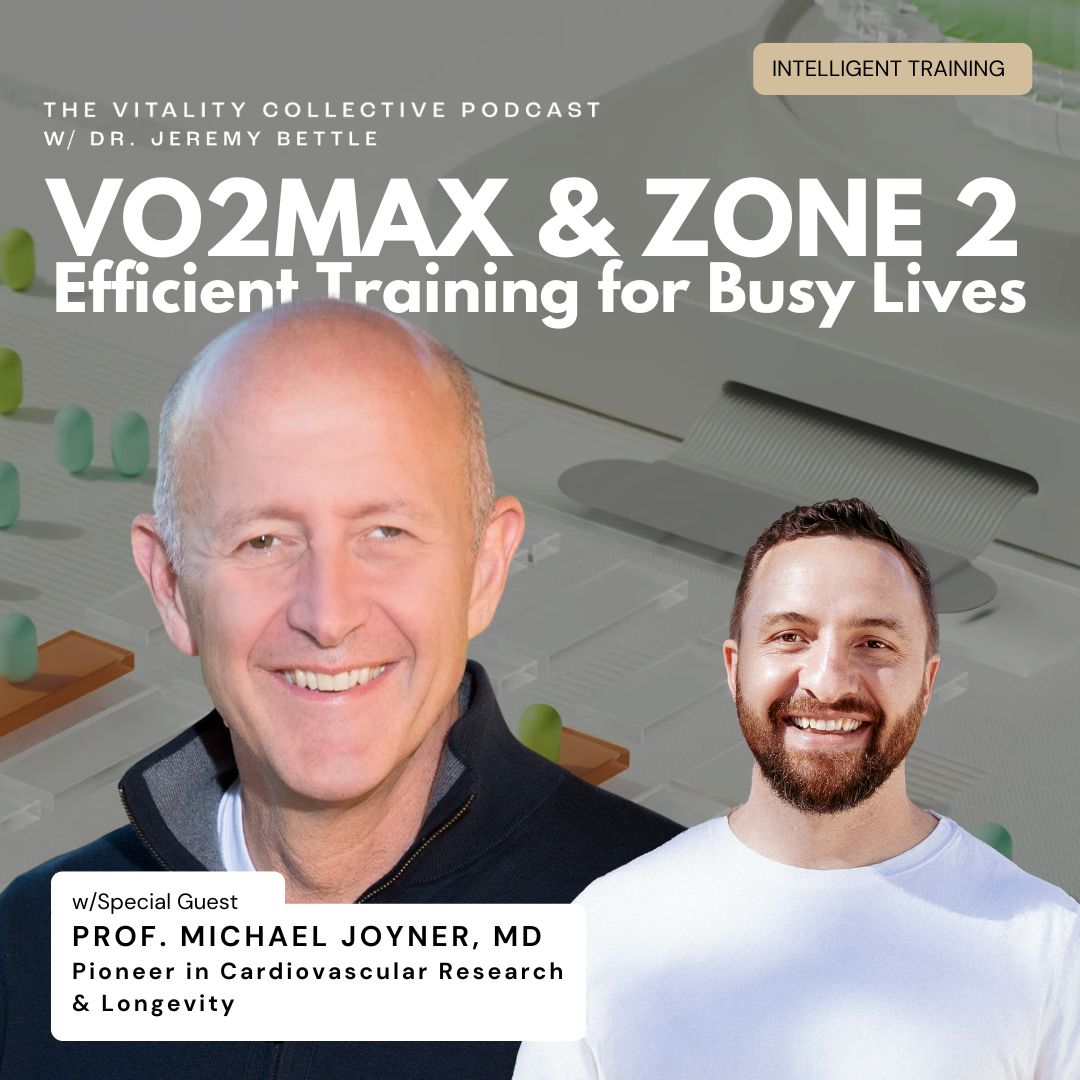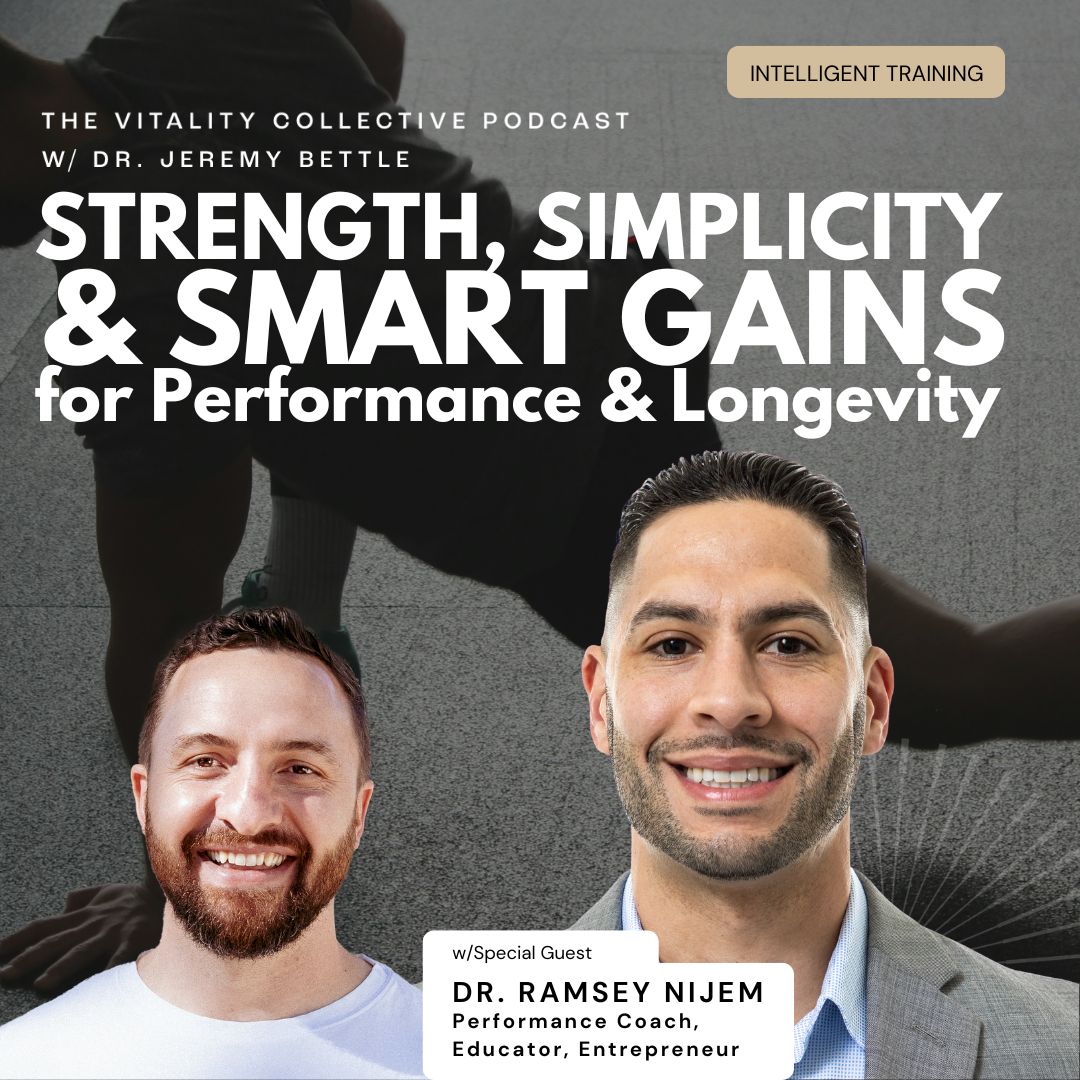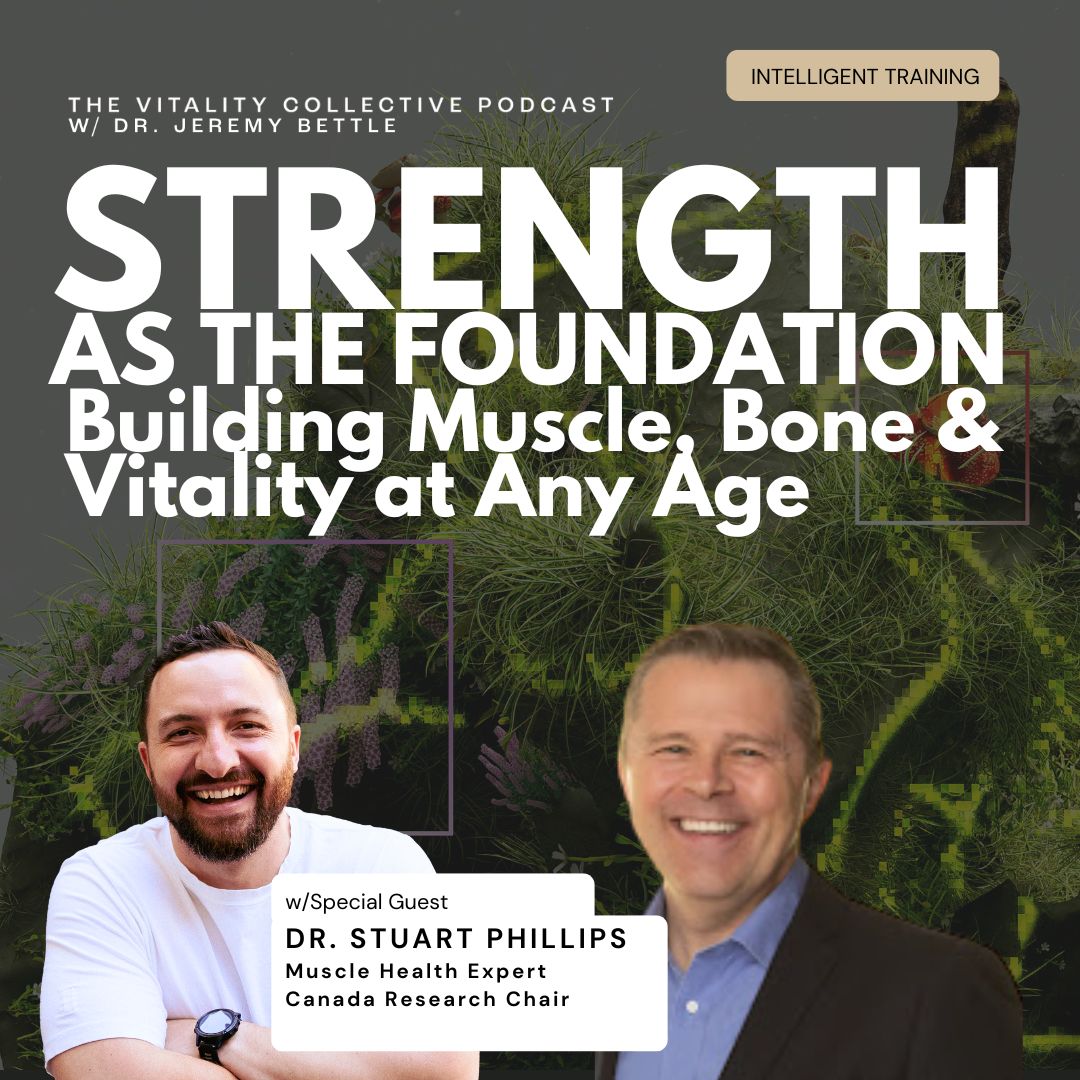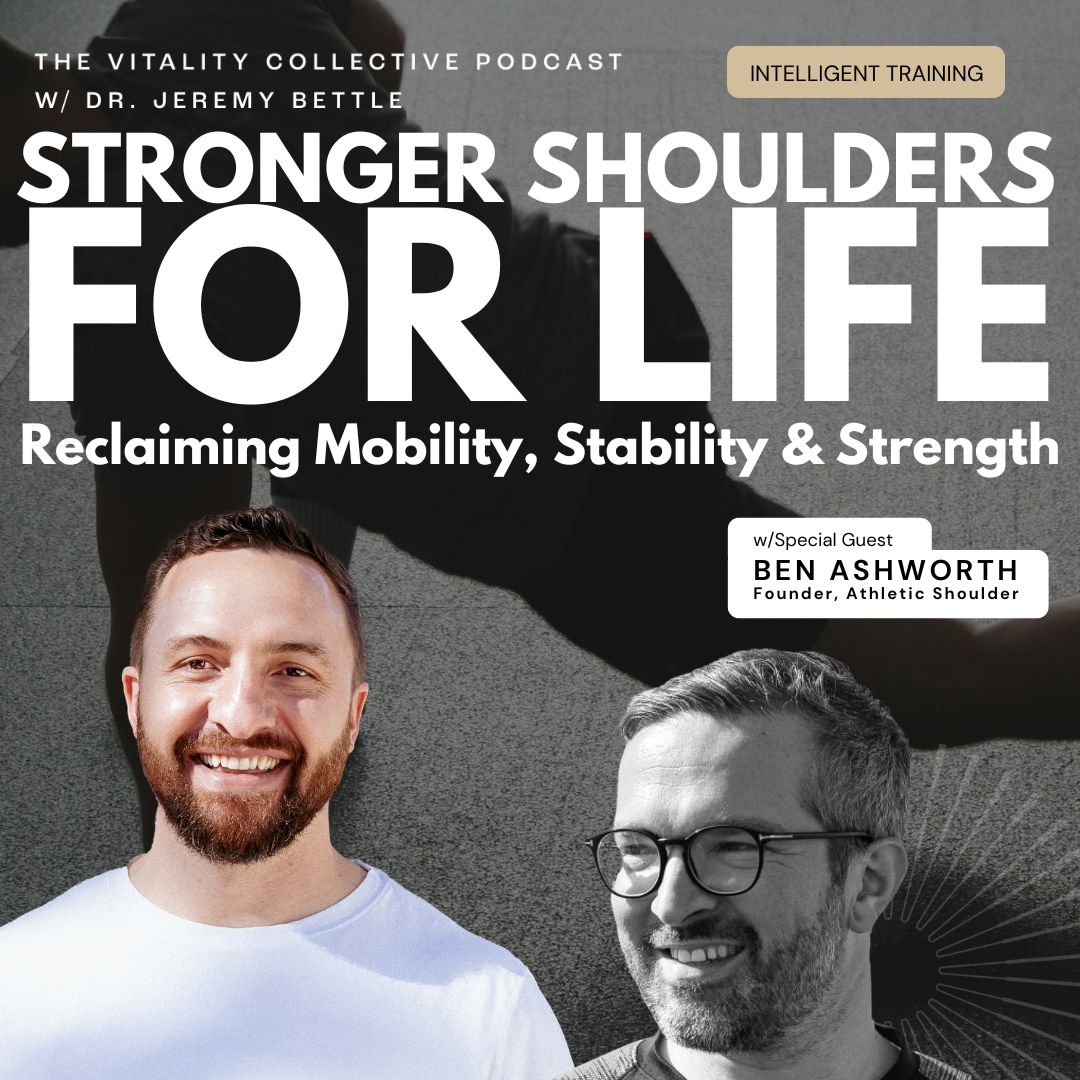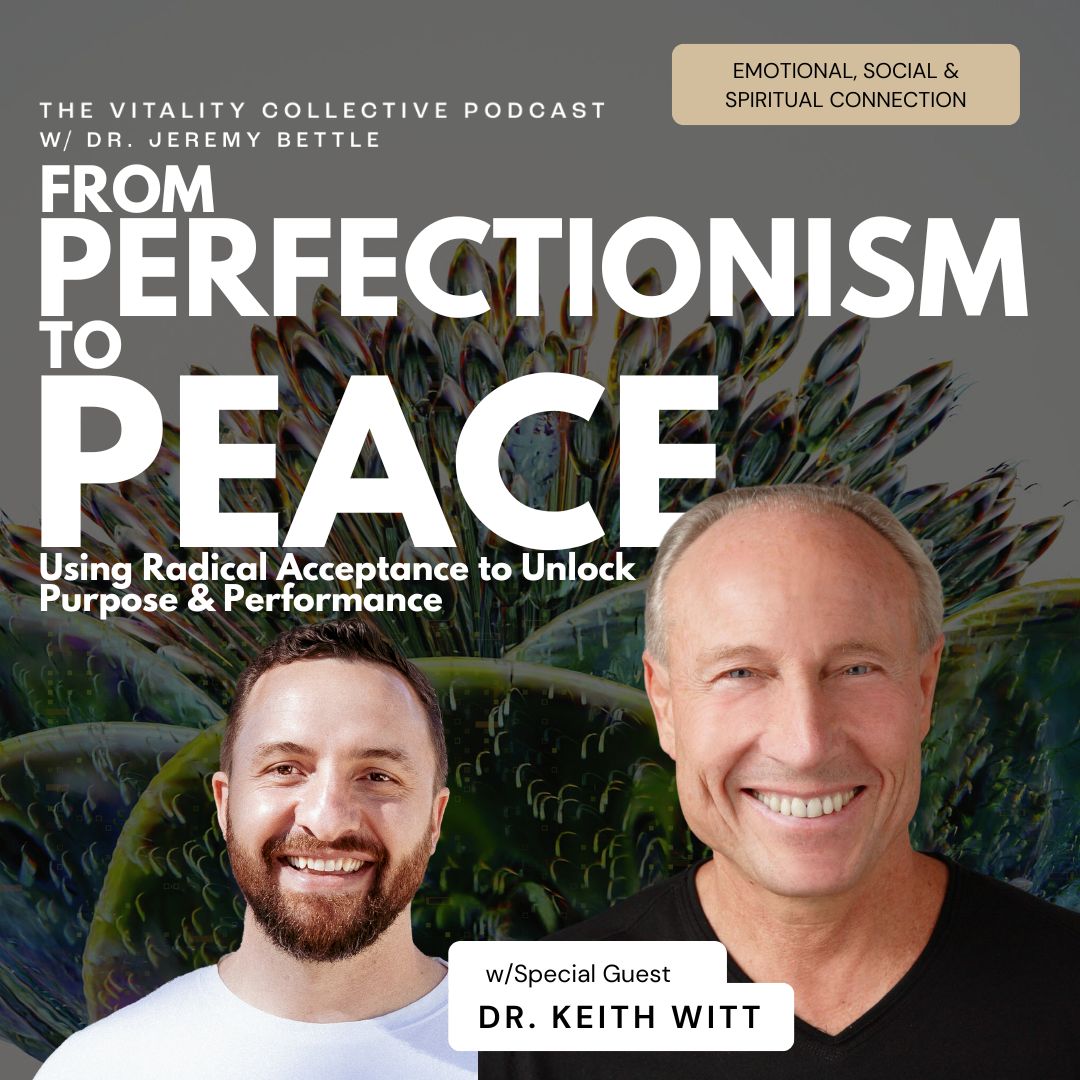Discover The Vitality Collective Podcast w/Dr. Jeremy Bettle
The Vitality Collective Podcast w/Dr. Jeremy Bettle

The Vitality Collective Podcast w/Dr. Jeremy Bettle
Author: Dr. Jeremy Bettle
Subscribed: 0Played: 3Subscribe
Share
© 2024
Description
Welcome to The Vitality Collective Podcast—your guide to living a life of strength, resilience, longevity, and vibrant health.
Hosted by Dr. Jeremy Bettle, PhD—an internationally recognized expert in Human Performance with over 20 years of experience working with elite athletes and high performers—this podcast brings world-class expertise straight to you.
Join us as we dive deep into vitality, uncovering groundbreaking insights from leading experts in longevity, performance, nutrition, sleep, brain health, emotional well-being, and proactive medicine. Through engaging conversations and actionable insights, we’ll empower you to unlock your potential, push past your limits, and make every day better!
Whether you’re looking to prevent illness, enhance performance, or simply feel your best, The Vitality Collective Podcast w/Dr. Jeremy Bettle is here to inspire, educate, and motivate you to thrive.
Thank you for listening.
https://www.vitality-collective.com
IG: https://www.instagram.com/vitalitycollectivemontecito
LI: https://www.linkedin.com/in/vitalitycollective
Hosted by Dr. Jeremy Bettle, PhD—an internationally recognized expert in Human Performance with over 20 years of experience working with elite athletes and high performers—this podcast brings world-class expertise straight to you.
Join us as we dive deep into vitality, uncovering groundbreaking insights from leading experts in longevity, performance, nutrition, sleep, brain health, emotional well-being, and proactive medicine. Through engaging conversations and actionable insights, we’ll empower you to unlock your potential, push past your limits, and make every day better!
Whether you’re looking to prevent illness, enhance performance, or simply feel your best, The Vitality Collective Podcast w/Dr. Jeremy Bettle is here to inspire, educate, and motivate you to thrive.
Thank you for listening.
https://www.vitality-collective.com
IG: https://www.instagram.com/vitalitycollectivemontecito
LI: https://www.linkedin.com/in/vitalitycollective
42 Episodes
Reverse
🎧 Episode Summary In this episode of The Vitality Collective Podcast, Dr. Jeremy Bettle is joined by Dr. Nick Caropino, Director of Rehabilitation for the Atlanta Falcons, to dive deep into the world of hamstring health, elite-level rehabilitation, and the systems that support injury prevention and recovery. Drawing from a high-stakes rehab they completed together during the MLS playoffs, the conversation unpacks how early loading, individualized programming, and environmental change are key to sustainable performance and healing. Whether you’re a pro athlete or an executive glued to a desk, this episode gives practical wisdom for overcoming chronic hamstring issues and investing in long-term vitality. 👤 Guest Bio – Dr. Nick Caropino Nick Caropino, DPT, is the Director of Rehabilitation for the Atlanta Falcons, where he leads performance, recovery, and return-to-play strategies for elite athletes. His career spans the NFL, MLS, and advanced clinical practice, including leadership roles at New York City FC and Athens Orthopedic Clinic. Known for his ability to integrate clinical excellence with high-performance sport demands, he specializes in building individualized and collaborative rehab programs that support both immediate recovery and long-term durability. 🔗 Guest Links LinkedIn: Nick Caropino ✅ Three Actionable Takeaways You Can Use Today View pain as an opportunity — Treat new pain or injury as a chance to build a better lifestyle, not just something to fix. Use it to open new doors for growth, health, and longevity. Stick to the fundamentals — Whether you’re a professional athlete or an executive, the foundation doesn’t change. Prioritize strength, mobility, nutrition, and sleep before chasing the next trendy fix. Keep doing the work — Sustainable health comes from consistent effort. Build habits that help you move, recover, and perform well at any age, whether that’s lifting your kids or stopping an NFL quarterback. 🔑 Key Takeaways Hamstring rehab at the elite level often begins within 24 hours, even for significant strains. The anatomy of the hamstring (crossing both the hip and knee) makes it uniquely complex — it's a power generator and a decelerator. Tendinopathy is often caused by compression and environment — especially prolonged sitting. Injury prevention isn't the job of one person; it's a system-wide challenge involving coaching, medical, and performance staff. Rehab should continue well beyond when the pain disappears. Insurance may stop, but the work shouldn’t. Passive modalities (shockwave, cold/heat, dry needling) play a support role — they aren’t the solution, but they can help you feel good enough to do the work. Nerve irritation can mimic hamstring pain — especially if it’s vague or migratory. Look for patterns, not just pain points. Rehab is about building new habits and opportunities — not just fixing pain. The best recovery results come from combining strength, nutrition, sleep, and environmental awareness. “Pro” protocols are often the same as general population programs — just with more support and precision. The principles remain the same.
🎧 Episode Summary: In this powerful episode of The Vitality Collective Podcast, Dr. Jeremy Bettle is joined by renowned therapist and educator Duey Freeman for a deep exploration into how early relational experiences shape the way we perform, relate, and lead. Speaking directly to high performers—whether in sport, business, or life—Duey breaks down why unresolved emotional patterns often drive our relentless pursuit of success, and how healing those patterns can unlock sustainable excellence, deeper self-worth, and meaningful relationships. This conversation is a must-listen for anyone who’s hit the top—and still felt empty. 👤 Guest Bio: Duey is a sought-after teacher, trainer, licensed therapist, and equine professional worldwide. He has taught internationally and developed a practical attachment theory and human development model taught to thousands of university students. He has nearly 80,000 direct client hours and co-founded the Gestalt Equine Institute and the Gestalt Institute of the Rockies. He supervises therapists and graduate students and does business and land consultations for new equine therapy sites. Duey embodies both tenderness and strength in all his relations and work. His quality of contact and relationship with others is authentic and unique. People come from around the world to study with him. Duey is a true elder and mentor exploring new horizons in facilitating men’s growth work. Gestalt and Relational Horsemanship are not just approaches to Duey; they are how he walks through the world. 🔗 Links & Mentions: Gestalt Equine Institute of the Rockies - http://www.gestaltequineinstitute.com/ Instagram: @DueyFreeman Facebook: @DueyFreeman www.DueyFreeman.org www.coloradoecotherapyinstitute.com ✅ Three Actionable Takeaways: Separate personhood from behavior and results — Anchor your worth in who you are, not in the outcomes you produce or how others react. When you remember that your value is not tied to performance, you create freedom to grow, take risks, and recover without shame. Heal relational injuries in relationship with others — Seek a therapist, mentor, coach, or trusted group because we do not heal alone. Healing happens in safe, supportive connections, and giving yourself permission to be witnessed and cared for is a powerful step toward wholeness. Learn and use breath and healthy emotional expression — Be conscious of how you breathe and pair it with the safe expression of emotion to regulate your state under stress. Your breath and your voice can become tools that bring calm, restore balance, and remind you that you have agency even in the hardest moments. 🧠 Key Takeaways: High performers often attach their self-worth to achievement, creating a cycle of burnout and dissatisfaction. Early attachment experiences—and how we felt supported or unseen—often shape our adult performance behavior. Sustainable success comes from internal grounding, not external validation. Without emotional integration, success can feel hollow—even at the top. Many high performers experience a loss of identity after transitioning out of sport or high-level careers. Nervous system states (fight, flight, freeze) impact how we perform under pressure. Awareness of those states is critical. Real confidence is consistency across contexts—not wearing different “hats” for different people. Grieving what we didn’t receive in childhood opens the door to deeper relationships and self-trust. Emotional wholeness allows performance to be an expression—not a performance for validation. Therapy, mentorship, or conscious relational work is not optional—it’s necessary for high performers who want to thrive.
🔎 Episode Summary: In this illuminating episode of The Vitality Collective Podcast, Dr. Jeremy Bettle sits down with Kyle Harris, CEO of BrainLit, to discuss the often-overlooked yet powerful role of light in human health, performance, and recovery. They explore how biocentric lighting systems can optimize circadian rhythms, improve cognitive function, reduce jet lag, and even enhance mood and sleep. From elite athletes to corporate professionals, Kyle explains how everyone can benefit from strategic light exposure—and offers both high-tech and practical solutions for making better light part of your daily routine. 👤 Guest Bio – Kyle Harris: Kyle is an accomplished CEO with over three decades of leadership experience spanning biotech, technology, and digital media. He currently serves as Global CEO of BrainLit AB, headquartered in Lund, Sweden, where he drives international growth, strategic partnerships, and investor engagement for the company’s pioneering Biocentric lighting solutions. Previously, he has scaled startups and small-cap companies across sectors—transforming eCommerce platforms, launching biotech products, building retail analytics software, and leading international marketing campaigns. His track record includes delivering significant investor returns, securing high-profile partnerships with teams in the NFL, NBA, MLB, and EPL and guiding companies through operational expansions, funding rounds, and acquisitions. He is also the founder of StrategyPoint, Inc., a technology accelerator advising portfolio companies in eCommerce, CPG, and digital media. His expertise has been featured in the Wall Street Journal, Sports Business Journal, Advertising Age, and Entrepreneur.com, and he has appeared on NBC, Fox, and iHeart Radio. 🔗 Links Mentioned: Promo Code: Vitality-Collective 20% Off The Alven store is: https://shop.brainlit.com/ Our global site is: https://www.brainlit.com/ Instagram: @brainlit_northamerica ✅ 3 Actionable Takeaways: Get Morning Light Daily: The brightness of natural sunlight on a clear day is around 100,000 LUX meaning that just 15 minutes of outdoor light shortly after waking is enough to align your circadian rhythm and boost energy. On a cloudy day 20-30 minutes is sufficient. Limit Afternoon Caffeine: Notice how your body responds to caffeine later in the day, and be mindful of its impact on your sleep. Cutting off caffeine after 2pm ensures that it is out of your system well before it is time to wind down for sleep. Be Consistent with Sleep & Wake Times: Keep your bedtime and wake-up time within an hour every day—even on weekends—to avoid “social jet lag.” 🔦 Key Takeaways: 🌞 Light does more than help us see—it’s a biological signal that impacts sleep, mood, focus, and hormone regulation. 🧠 Biocentric lighting mimics natural light patterns, modulating spectrum and intensity throughout the day to support optimal circadian health. ⏰ Melatonin and cortisol balance is deeply influenced by light exposure, particularly the timing and spectral quality. 💡 Typical office and indoor lighting is inadequate, often disrupting circadian rhythms and contributing to fatigue and reduced cognitive performance. 🏋️ Light is a powerful but underutilized performance enhancer, especially for cognitive athletes like executives and traders. ✈️ Biocentric lighting can aid in jet lag mitigation by adjusting light spectrum to suit travel patterns and time zone changes. 🏥 In hospitals, schools, and corporate settings, light can support performance, focus, recovery, and well-being without active user input. 🚫 Not all light therapy products are equal—volume, angle, and spectrum matter. Many SAD lamps on the market fall short. 🔬 BrainLit’s system is a turnkey platform, future-proofed to adapt with emerging science and changing user needs. ⚖️ Over-correcting (like always wearing blue light blockers) can be counterproductive—timing is everything.
🔍 Episode Summary: In this eye-opening episode, Dr. Jeremy Bettle welcomes Dr. Carlos Daniel for a powerful conversation on the rising crisis of early specialization in youth sports. Drawing from over two decades of experience across the NBA, academia, and youth development, Dr. Daniel unpacks how overuse, burnout, and unrealistic expectations are taking a toll on young athletes—both physically and mentally. From science to strategy, this episode offers practical tools for parents and coaches to help their athletes stay healthy, resilient, and passionate about sport for the long haul. 👤 Guest Bio (Official): Dr. Carlos Daniel brings over 22 years of experience in basketball as a player, coach, and educator. His unique background blends elite on-court expertise with academic research, including coaching roles at both the collegiate and NBA levels, leading youth basketball camps, and founding a youth basketball organization focused on skill development and mentorship for at-risk adolescents. Carlos’s academic work is grounded in his lived experience, culminating in a doctoral dissertation exploring the load exposure of elite youth male basketball athletes in relation to NBA recommendations. His programs are designed to improve safety, prevent injury, and enhance long-term athletic performance for young athletes. A former Director of Athletic Development in the NBA, Carlos now serves as Program Chair and Assistant Professor of Kinesiology at Concordia University Texas, where he continues to lead, teach, and advocate for best practices in youth sports and performance science. 🔗 Guest Links: Instagram: @drlos_strong LinkedIn: Dr. Carlos Daniel ✅ 3 Actionable Takeaways: Fight for what is right, not what is comfortable: You have to be willing to have difficult conversations to do what you know is best for your child. Prioritize recovery, sleep, & nutrition: Only during proper recovery & with proper fueling does the body adapt to training load. If you want your kid to improve, they need to recover and fuel appropriately. Find out how to deal with the pressure gauge :How do you help your kid regulate their mental, spiritual, & physical health to deal with the pressure that they are under. 📌 10 Key Takeaways: Early specialization is a system problem, not a talent strategy. Young athletes are playing more than pros, without the same recovery infrastructure. Injuries are happening earlier and careers are getting shorter. Overuse injuries that used to occur in athletes' 30s are now showing up in their early 20s. Most young athletes survive early specialization. They don’t thrive through it. Multiple “load streams” stack up fast. Club teams, school programs, and trainers all contribute to one cumulative toll on the body. The 10,000-hour rule is misapplied. It works for finite skills, but not for complex, multidimensional sports like basketball. "Elite" is often misused. Playing 150 games doesn’t make an athlete elite—it makes them overexposed and exhausted. Rest is where the gains happen. The body adapts during recovery—not during activity. Recovery is training. Cross-training with other sports builds better movement skills. Parents must advocate for their child’s health. Saying “no” to overload is brave—and necessary. Pressure from parents, coaches, and culture can lead to resentment and burnout.Sport should be fun. If it’s not, something’s broken.
1. Episode Summary In this episode, Dr. Jeremy Bettle sits down with Troy Taylor, Vice President of Performance Innovation at Tonal, to explore the surprising parallels between elite athletic performance and general population health. They discuss how the principles of goal-setting, data-driven training, and behavioral design that once applied to pro athletes are now shaping the future of consumer fitness. Troy shares insights from his experience with elite athletes and explains how Tonal's technology helps people build consistent, effective habits for long-term vitality. 2. Guest Bio Troy Taylor is a globally recognized leader in human performance, with more than 20 years advancing the science of sport and fitness. Over his career, he has guided over 250 Olympic athletes and more than 50 medalists, while directing innovation at organizations like U.S. Ski & Snowboard and the Canadian Sport Institute Ontario. As High Performance Director for U.S. Ski & Snowboard, Troy led the team supporting 15 Olympic medalists; including seven golds, at the 2018 Pyeongchang Winter Games. Today, as Vice President of Performance Innovation at Tonal, Troy launched the Tonal Strength Institute; an industry-first hub for research, thought leadership, and partnerships that push the boundaries of strength training. His career has been defined by pioneering at the intersection of science and product, serving as co-inventor on new fitness technologies and leading initiatives that connect evidence-based research to millions of everyday athletes. Troy has commissioned groundbreaking studies, funded countless PhDs, and shaped global conversations on how physiology, technology, and behavior science combine to fuel human potential. 3. Links Troy Taylor Instagram: @strengthsciencetroy Troy Taylor LinkedIn: https://www.linkedin.com/in/troy-taylor-4577bb38/ 4. Three Actionable Takeaways Be clear on your goals: Determine what you are training for, whether it's to hike or play with your grandkids, and reverse-engineer your training from there. This will help you filter out noise in the wellness space. Learn how to evaluate information: You don't need to be a research scientist, but understanding the basics of reading data and research can help you cut through the noise and avoid misinformation from influencers. Iterate like an engineer: Don't throw out your entire plan when you hear something new. Continuously make small improvements and add new layers to your training over time, just like an engineer refines a product. 5. 10 Bulleted Takeaways The similarities between pro athletes and the general population are far greater than the differences. The "wellness boom" has not translated into better health outcomes, in part because people lack clear goals. Being your own "performance director" in a world of new technology means you have to be an active participant in your fitness journey. Shiny, new technologies often attract people, but it's important to consider if they truly help you reach your goals. More data isn't always better; too much data can be paralyzing and lead to negative self-talk. Consistency is the single most important factor for long-term health and vitality. "Exercise snacks"—short, micro-workouts of one to five minutes—can be a highly effective way to build consistency and improve health. A flexible "Plan B" for your training can help you stay consistent even when life and time get in the way. Many people mistakenly focus on auxiliary details like specific supplements or "hacks" rather than the fundamentals of consistent training. Identity is a powerful motivator; technology and community can help you see yourself as "someone who works out," making consistency easier.
Episode Summary In this powerful episode, Dr. Jeremy Bettle sits down with Sofia Smati, a high-performance coach at the Red Bull Performance Center, to unpack what it actually takes to train female athletes at the highest level. Drawing on her own experience as a former soccer player and her work with everyone from Olympic skaterboarders to e-gamers and 92-year-olds, Sofia challenges one-size-fits-all approaches to training—especially those based purely on gender or cycle timing. She makes a clear case for treating athletes as individuals, training for the demands of the sport, and keeping things simple, consistent, and adaptable. This is a grounded, refreshing conversation that champions women's strength, intelligence, and capacity—without the fluff. Guest Bio: Sofia Smati Sofia Smati is a Performance Coach at the Red Bull Performance Center in Los Angeles, where she works with Olympians and professional athletes through a science-driven, personalized approach that prioritizes measurable results. A former soccer player with a Master’s in Sports Science, Sofia brings both academic rigor and firsthand athletic experience to her coaching. Since 2017, she has contributed to the sports performance field through research and publishing, blending evidence-based methods with practical insights. Her mission is clear: to empower athletes to push boundaries, elevate performance, and unlock their full potential. Guest Links Instagram: @smtperformance_ 3 Actionable Items for Listeners You train the person, not the gender. Individual needs, goals, and context matter far more than whether someone is male or female. Consistency is everything. Outcomes in strength, resilience, and longevity come from showing up and progressing week to week—not from chasing trendy protocols. Strong is simple. Whether you're training Olympians or someone in their 60s, the fundamentals—lift, recover, eat well, and move with intent—are what create results. 10 Key Takeaways “I don’t coach gender—I coach individuals.” Training should be adapted to the athlete, not their gender. Too much information can hinder performance. Simplifying and filtering training advice allows athletes to focus on what truly moves the needle. Reactive strength matters. Measuring your strength gains relative to your body weight gives you a real measure of your strength and not a comparison to somebody else. Even gamers are athletes. Strength training improves focus, posture, and reduces injury risk for e-gamers and cognitive athletes alike. Relate this to life outside of sport which often requires a lot of sitting! Progressive overload is king. No matter the goal—hypertrophy (building muscle), performance, or longevity—consistent progression is non-negotiable. Cycle syncing is ineffective. Currently, there’s no evidence that training must be tailored to the menstrual cycle; feedback should be individualized. Bulking fears are largely unfounded. Women lack the testosterone levels and often volume needed for significant hypertrophy without deliberate effort. Women are not fragile. Sofia’s athletes, like SailGP’s only female grinder, often outperform their male counterparts in relative strength. Confidence is built in the weight room. Strength training transforms how women carry themselves, both in and out of sport. Longevity starts now. What you build in your 20s and 30s sets the foundation for your 60s, 70s, and beyond.
Episode Summary In this episode, Dr. Jeremy Bettle speaks with Dr. Lauren Colenso-Semple, PhD a science communicator with expertise in female physiology and exercise. They dismantle common myths and misinformation surrounding women's fitness and dieting, offering a practical, research-backed framework for building strength, lean mass, and bone health. They discuss how to build a consistent and sustainable fitness routine, why trusting the process is more important than chasing fads, and how to spot red flags from influencers who may be doing more harm than good. Guest Bio Lauren Colenso-Semple, PhD is a science communicator with expertise in female physiology and exercise. Through her research, teaching, public speaking, and online platforms, Dr. Lauren is known for making complex topics accessible—and for calling out the myths that hold women back from reaching their full potential. She is also a seasoned fitness professional with extensive hands-on coaching experience and a co-owner of the MASS Research Review, where she helps bridge the gap between cutting-edge research and practical fitness strategies. Links Dr. Lauren Colenso-Semple Instagram: @drlaurencs1 Mass Research Review: massresearchreview.com Top Three Takeaways Focus on the long game — Be patient and consistent with your training, focusing on long-term goals rather than quick fixes. All meaningful changes take time, but the physiological adaptations you build will be worth the effort . Do what you enjoy — Physical activity of any kind that you enjoy is a key piece of a sustainable plan. You can make your exercise framework flexible by picking exercises you like, using machines, or working with a trainer to find a routine that works for you. Lift weights for longevity — If you are unsure where to start, begin by lifting weights. Strength training provides benefits for muscle, bone, and physical function that will help you set yourself up for better aging and long-term independence. Topics Covered Women are not "small men," but they are also not "large mice". Research in humans, not animals, should be used to inform training and nutrition recommendations. The idea that women should avoid lifting weights because they will get "bulky" is a myth that has historically led to ineffective fitness programs being marketed to women. "Heavy" is a relative term in weightlifting; the goal is to train at an intensity that is challenging and close to failure for you. Progressive overload means continuously challenging yourself by adding more weight or more repetitions over time as you get stronger. Body composition—the ratio of muscle to body fat—is more important for longevity than the number on a scale. Chronically under-fueling your body can interfere with muscle growth because your body will prioritize essential functions over optional goals. There is no evidence to support that fasted training is a waste of time or that it negatively impacts your ability to build muscle or lose fat. There is no scientific basis for syncing your training with your menstrual cycle. Doing so can actually hinder progress by disrupting consistency. Be cautious of influencers who recommend complex protocols based on small-scale studies and remember that there is no "good" or "bad" muscle fiber type distribution. The goal of a workout program should be to prepare your body for the activities you love to do, not to restrict you from them.
Episode Summary In this episode, Dr. Jeremy Bettle is joined by Dr. Belinda Beck, professor and founder of The Bone Clinic, to explore the often-overlooked world of bone health. They unpack what osteopenia and osteoporosis really mean, why bone density is not just about minerals, and how movement, loading, and nutrition determine resilience across life. From the science of mechanotransduction to the realities of training safely at any age, this conversation provides clarity on how to protect and strengthen your bones for long-term vitality. Guest Bio Belinda Beck is a Professor in Exercise Physiology at Griffith University (Gold Coast, QLD) and Director of The Bone Clinic (Brisbane), a translational research facility and clinical practice providing evidence-based exercise for patients with osteoporosis. She graduated from The University of Queensland (BHMS[Ed]) and the University of Oregon (MSc and PhD) and completed a postdoctoral research fellowship in the Stanford University School of Medicine (CA, USA). Her work, primarily related to the effects of mechanical loading on bone, has involved both animal and human models, from basic to clinical research. Her particular focuses have been exercise interventions across the lifespan for the prevention of osteoporotic fracture, and the management of bone stress injuries in athletes and military recruits. She is a Fellow of the American Society of Bone and Mineral Research (ASBMR), the American College of Sports Medicine (ACSM), Sports Medicine Australia (SMA), and Exercise Sports Science Australia (ESSA). She serves on the Council of the Australian and New Zealand Bone and Mineral Society (ANZBMS), the Board of Sports Medicine Australia, the Governing Committee of the Australian National Alliance for Secondary Fracture Prevention (SOS Fracture Alliance), and the Capture the Fracture® (CTF) Steering Committee of International Osteoporosis Foundation, along with the Medicine and Science Advisory (MSAC) and National Consumer Advisory Committees (NCAC) for Healthy Bones Australia. She has been awarded almost $8M in grant funding and has published over 150 papers and chapters in the field. Links Onero program The Bone Clinic: Facebook – The Bone Clinic Dr. Belinda Beck on LinkedIn Healthy Bones Australia Three Actionable Takeaways Try to do more movement and make that movement more intense than you’re used to doing. Progressive overload is essential for bones to adapt and strengthen. Listen to your body. If you feel pain, listen to your body and stop doing what it is that’s causing the pain. Pain is a signal, not something to push through when it comes to bone health. Make sure you provide your body with the building blocks to build bone. Nutrition, particularly protein, calcium, and vitamin D, supports the adaptations triggered by exercise. Top Takeaways Bone is a living tissue with cells that remodel in response to load, not an inert structure . Bone adapts only when overloaded: activities like walking or swimming alone are insufficient for improving bone density . High-impact or heavy lifting exercises stimulate bone growth but must be introduced progressively and safely . Fall prevention is as critical as bone density; training balance and plyometric ability reduces fracture risk . Energy availability is essential—calorie deficits and low estrogen states significantly weaken bones . Peak bone mass is reached between ages 18–30, but activity levels largely determine how much is maintained across life . Osteopenia and osteoporosis are defined by T scores from bone density tests, but fracture risk is influenced by more than density . Most fractures occur in people with osteopenia, largely because of population size . DEXA scans are the most widely used tool but have limitations; alternatives like PQCT and trabecular bone score provide more detail . Supplements like high-dose vitamin K2 or magnesium lack strong evidence compared to balanced diets with adequate calcium, vitamin D, and protein .
Episode Summary In this episode, Jeremy and Michelle break down the principles of injury prevention and why avoiding frailty should be the top priority for anyone seeking long-term vitality. Drawing from Jeremy’s decades in professional sports, they connect elite athlete injury-prevention systems to everyday life—whether that’s playing pickleball, sitting at a desk, or managing bone health in your 80s. The conversation covers how to assess your current capacity, prepare for the demands of your activities, and avoid common pitfalls caused by trendy but risky training advice. Links www.vitality-collective.com Instagram: @vitalitycollectiveperformance LinkedIn: @vitalitycollective Episode 23 with Brian Wolfe Episode 27 with Dr. Ramsey Nijem Exact Three Actionable Takeaways “Understand where you are relative to what you want to be able to do.” In other words, assess your current capacity honestly so you can train for the demands you’ll face without setting yourself up for injury. “Don’t push through pain.” Pain is a signal, not a challenge—address it early so you can make lasting progress instead of creating setbacks. “Keep going. Just move. Do the things you love to do.” Staying active in ways you enjoy builds both physical resilience and a strong community around you. Key Takeaways Injury prevention starts with matching your physical capacity to the demands of your activity. Avoiding frailty should be the number one longevity goal, as it keeps you active and able to participate in what you love. Many injuries are predictable and preventable when you track capacity and risk factors throughout the year. Everyday people face the same movement demands as athletes, just at different levels of intensity. Sitting for long periods can cause significant musculoskeletal issues, requiring targeted preparation and training. A clear care spectrum—from physician to PT to performance coach—ensures safe and effective progression. Bone density improvements require a progressive approach, not jumping immediately to high-risk training like heavy plyometrics. Progression for older adults should be deliberate, moving from pain reduction to strength work to landing and jump training. The most effective training principles—strength, power, mobility—apply across all sports and ages. Beware of absolute, one-size-fits-all fitness advice; personal context and gradual progression matter most.
Episode Summary In this episode, Dr. Jeremy Bettle sits down with meditation and breath work expert Martin Bone to explore how mindfulness can profoundly impact your personal and professional life. They discuss practical techniques to reclaim attention, manage anxiety, and regulate emotions in high-stress environments. Martin shares insights from his transformative retreats, highlighting how breath work and meditation can create a sustained sense of presence and enjoyment in everyday experiences. If you’re looking for actionable steps toward greater clarity, reduced stress, and lasting vitality, this conversation delivers. ⸻ Guest Bio Martin Bone is a grounded visionary from Liverpool — a meditation teacher, soulful leader, and director of Oneness Children’s Care Home, where love and responsibility shape the future of young lives. With over 8 years of guiding meditation and self-mastery, he’s also the co-founder of Win Win Water, a bold project bringing hydration and harmony to communities worldwide. A Jedi at heart, Martin blends Scouse charm, deep spiritual wisdom, and entrepreneurial fire to build a life rich in purpose, presence, and prosperity. ⸻ Links Martin Bone Instagram https://www.martinbonemeditation.com/ ⸻ Three Actionable Takeaways Set an intention and create some space - Even five intentional minutes can transform your day. Start small and build from there. Enjoy it - Embrace the journey, find joy in your practice, and let consistency guide you to lasting change. Don’t take it so seriously - Remember to approach meditation with curiosity and kindness rather than perfectionism. ⸻ Takeaways Meditation is not about clearing your mind but learning how to reclaim your attention and manage thoughts. Breath work and meditation are complementary practices, described by Martin as “two wings of the same bird.” High performers benefit significantly by pausing to reflect on their direction rather than relentlessly pursuing goals without reflection. Regular meditation and mindfulness practices can help reduce chronic stress by regulating cortisol levels. Emotional regulation involves sitting with uncomfortable feelings instead of seeking immediate distraction or gratification. Short mindfulness sessions between daily activities help maintain presence and reduce emotional reactivity. Starting a meditation practice can be as simple as committing to five minutes per day and gradually building from there. True high performance comes from enjoying the process rather than being fixated solely on outcomes.
🎙️ Episode Summary In this episode of The Vitality Collective Podcast, Dr. Jeremy Bettle sits down with Dr. Angus Mugford, a world leader in sport and organizational psychology, to explore what it means to truly thrive at the highest levels of performance. Drawing on decades of experience from the USTA to the Toronto Blue Jays and beyond, Angus shares practical, science-backed strategies for building psychologically safe environments, developing resilient teams, and cultivating leadership that lasts. Whether you’re a coach, executive, or ambitious professional, this episode unpacks what sits beneath consistent excellence—and why who you are matters more than what you do. 👤 Guest Bio: Dr. Angus Mugford Dr. Angus Mugford is a seasoned leader with over 20 years of experience driving high-performance cultures and teams, including the Toronto Blue Jays (MLB), New Jersey Devils (NHL), and most recently as Managing Director for Performance and Operations at the United States Tennis Association (USTA). His expertise spans building and transforming departments, overseeing player development and athlete care, and implementing data-driven strategies to enhance player performance. Originally from the UK, he earned a PhD at the University of Kansas, and spending over a decade at the IMG Academy in Florida working across a broad range of sports. Dr Mugford also served as the President of the Association for Applied Sport Psychology, speaking across the world and publishing in academic journals and popular media. 🔗 Mentioned Links USTA (United States Tennis Association) LinkedIn ✅ Three Actionable Takeaways: Self-awareness: “The first thing is just awareness… what is your performance, when is it good and when is it not, and kind of deconstructing and understanding those pieces.” Look at your routines: “Look at your day as a routine—how you prepare, how you go about your work or compete, and then how you recover.” Get really clear about your goals: “Be more concrete and clear about goals… what are you trying to achieve? And is that something that you have control over?” 🔑 10 Key Takeaways Psychological safety isn’t about being soft—it’s about creating the conditions for risk-taking, innovation, and truth-telling. Leaders must understand how stress affects performance and create environments that support resilience. High performance isn’t built by talent alone—it’s cultivated through daily habits, trust, and feedback. Most elite performers need permission to rest. True recovery must be normalized, not earned. Self-awareness is a competitive advantage; taking time to reflect can elevate performance and leadership. Culture is built one behavior at a time—consistency and clarity matter more than slogans. Coaching the coaches is critical. Support systems for leaders enable better decision-making under pressure. The transition from “what you do” to “who you are” is key for longevity in leadership roles. Angus emphasizes curiosity over control—great leaders ask better questions, rather than seeking certainty. Values-driven leadership isn’t a buzzword. It’s a performance strategy with long-term impact.
🎧 Episode Summary: In this episode of The Vitality Collective Podcast, Dr. Jeremy Bettle is joined by performance coach, author, and leadership mentor Jesse Wright to explore how leadership behaviors influence personal health, team performance, and organizational culture. Drawing from years in the NBA and his current work in leadership coaching, Jesse dives deep into the concept of stress as a social contagion and the often-overlooked health habits of leaders. The conversation flows through the value of structure, sleep, strength training, and routines—and how high performers can build lasting systems that enhance both vitality and performance. 👤 Guest Bio: Jesse K. Wright is a seasoned high-performance coach and mentor with over two decades of experience, including 14 years in the NBA. He is the founder of Balance the Bar, an educational platform that teaches interpersonal skills to aspiring professionals. Jesse is also the author of The Intent Is to Grow, a business parable designed to help emerging practitioners navigate the soft skills critical to career success. His work now bridges the worlds of elite sport and executive leadership, helping individuals and teams thrive through performance-driven health strategies. 🔗 Links & Resources: Instagram: @jessekwright Website: www.balancethebar.com Book: The Intent Is to Grow – Available on Amazon LinkedIn: Jesse K. Wright ✅ 3 Actionable Takeaways: Establish a Performance Primer: Begin each day with a simple, repeatable action (e.g., journaling, prepping your workspace, or organizing your gear) to set the tone for performance and focus. Prioritize Sleep as a Strategic Advantage: Treat sleep as a tool for peak decision-making, emotional regulation, and high-stakes leadership—not a weakness or expendable resource. Color Your Plate: Aim for colorful vegetables and fruits with every meal to improve energy, brain health, and emotional resilience. 📌 Key Takeaways from the Conversation: Stress is contagious—leaders set the emotional climate for their teams and families. The most impactful leaders model their values through healthy routines. Lack of sleep and poor recovery undermine both executive and athletic performance. The “badge of honor” culture around overwork is a silent killer of productivity. Routines, even as small as laying out your clothes, can prime high performance. Strength training adds life to your years; cardiovascular training adds years to your life. Pro athletes don't rely on hacks—they double down on the basics done consistently. Leaders need game-day routines just as athletes do—peak performance is prepared. Decision-making capacity, creativity, and emotional intelligence are all tied to health habits. Healthy habits aren’t soft—they’re what enable sustained elite performance.
🎧 Episode Summary In this powerful conversation, Dr. Jeremy Bettle sits down with renowned coach and author Cody Royle to explore the complex realities of leading at the highest level. From the emotional toll of head coaching roles to the systemic blind spots that sabotage sustained success, Cody breaks down the myths of modern high performance. Together, they unpack why coaching isn’t a sign of weakness, but a critical performance enhancer—essential not just in sport, but in any high-pressure environment. If you’re striving for longevity, leadership impact, and true excellence, this episode will resonate deeply. 👤 Guest Bio: Cody Royle Cody Royle is a globally respected leadership coach who works exclusively with head coaches in elite sport. After a decade as head coach of Canada’s men’s AFL national team, Cody now mentors a select group of professional coaches across soccer, basketball, baseball, ice hockey, rugby union, rugby league, and Australian football. His insights have helped leaders at the highest levels sharpen their performance, navigate the emotional toll of the job, and build sustainable success. Cody is also the author of three books, including The Tough Stuff—an Amazon bestseller exploring the emotional burden of coaching—and Second Set of Eyes, which examines how elite head coaches gain a competitive edge by getting coached themselves. Beyond his work, Cody is a father, husband, son, brother, and grandson. Originally from Melbourne, Australia, he now lives in Toronto, Canada, and remains deeply connected to a family spread across the globe. 🔗 Guest Links 🌐 Website: https://www.codyroyle.com 💼 LinkedIn: Cody Royle on LinkedIn 🐦 Twitter/X: @codyroyle ✅ Three Actionable Takeaways Ask Yourself the Three Coaching Questions Reflect on: What are you hoping to achieve? Who are you hoping to be as you achieve it? What’s in the way right now? Map the Real Demands of Your Role Move beyond job titles—take inventory of what you actually do each day, and identify where your energy and focus are best used. Prioritize Recovery Like a Pro Protect your vitality by making time for sleep, exercise, and meaningful connection—even in the busiest seasons. 🔑 Key Takeaways The culture of coaching has been shaped by chronic individualism, leading to burnout and poor decision-making at the top. High performers often wait until a breaking point—loneliness, isolation, or exhaustion—before seeking coaching. Coaching is a human-to-human performance enhancer, not a remedy for failure. Leaders often perform best when they can look beyond the daily grind with the help of a coach who “keeps their eyes up.” Traits of exceptional performers include relentless curiosity, emotional endurance, and a dreamer’s mindset. Systems should train coaches just as they train athletes—through specificity, support, and stress exposure. Sleep directly impacts key coaching skills: attention, communication, and decision-making. The current model of sport (and business) pushes people toward the middle; juggernauts push against it. True high performance is holistic—it must include emotional, physical, relational, and cognitive health. The future of women's sports will demand higher pressure readiness, not just technical expertise.
Episode Summary: In this insightful episode of The Vitality Collective Podcast, Dr. Jeremy Bettle is joined by Dr. Mike Joyner, a leading expert on cardiovascular fitness and human performance. They explore the concepts of VO2 max, Zone 2 training, and their critical roles in longevity and vitality. Dr. Joyner clarifies common misunderstandings about cardiovascular fitness and provides practical, actionable strategies for integrating effective exercise into busy lifestyles. Guest Bio: Dr. Michael Joyner has broad-based interests related to integrative physiology in humans, and he also practices clinical medicine as an Anesthesiologist at the Mayo Clinic. His specific areas of expertise include autonomic control of circulation, muscle and skin blood flow, exercise, oxygen transport, and metabolic regulation in humans. This work has been continuously funded by the NIH since the early 1990s. During the COVID-19 pandemic, he repurposed his lab and led the U.S. Expanded Access Program for Convalescent Plasma and has an emerging interest in passive immunity and antibody therapy for infectious diseases. In addition to his funded work, he also has significant expertise in the physiology of human performance, including the original work that led to the sub-2-hour marathon. Connect with Dr. Mike Joyner: YouTube Lectures Cooper Test Follow Dr. Joyner on X 5 BX Program Three Actionable Takeaways: 1. Focus on What You Can Do: Don’t permit what you cannot do to interfere with what you can do. Find something manageable that you can consistently integrate into your daily routine. 2. Prioritize Achievement over Activity: Don’t mistake mere activity for genuine achievement. Avoid getting overly obsessed with metrics and instead focus on meaningful outcomes from your physical activities. 3. Embrace Minimalism First: To become effective at anything, first eliminate distractions and unnecessary commitments. Simplify your schedule to focus on actions that meaningfully improve your health and vitality. Top 10 Bulleted Takeaways: VO2 max is a critical marker of cardiovascular fitness and longevity. Zone 2 training is moderate-intensity exercise where you can comfortably hold a conversation. Exercise significantly improves overall health metrics beyond just VO2 max. Lifelong physical activity dramatically reduces cardiovascular risk. Specialized athletic training may not provide longevity benefits if discontinued post-career. Strength training is vital for maintaining independence and preventing injuries in older age. Regular assessments (like the Cooper Test) can estimate your VO2 max effectively without advanced lab testing. High-intensity interval training complements Zone 2 work, optimizing overall fitness. Building exercise into daily routines increases long-term adherence. Simplifying routines and avoiding overcomplication leads to greater health and fitness sustainability.
Episode Summary: In this engaging episode of The Vitality Collective Podcast, Dr. Jeremy Bettle is joined by Ramsey Nijem, renowned as the youngest head strength coach in NBA history and now a National Champion at the University of Kansas. Jeremy and Ramsey delve into their shared history and philosophies on strength training, injury prevention, and optimizing performance. The conversation explores practical ways to approach strength training, progressive overload strategies, and the significant role of creatine supplementation for both athletic and general populations. Guest Bio: Ramsey Nijem is a performance coach, educator, and entrepreneur with a doctorate in Human and Sports Performance. He served as the Head Strength & Conditioning Coach for the Sacramento Kings and is currently the Director of Sport Performance for the University of Kansas Men’s Basketball program, where he contributed to a National Championship. He is also the founder of Applied Performance, an education company helping performance and rehab professionals gain clarity and confidence in their knowledge, impact, and careers. Connect with Ramsey: Instagram: @dr.ramsey.nijem Website: Applied Performance Coach Certification Creatine Gummies: Create Creatine Gummies Three Actionable Takeaways: Lower the Barrier to Entry: Begin with something as simple as taking a walk every day. Consistency Over Intensity: Take a long-term view in your training progression, focusing on gradual improvements rather than rushing the process. Holistic Approach: Recognize the compound benefits of strength training, Proper sleep, and great nutrition for overall vitality. Top 10 Takeaways: Creating environments of curiosity and continuous learning is essential in coaching. Training should reflect the demands of your sport or daily activities. Progressive overload involves gradually increasing difficulty through load, volume, or intensity. Injury prevention is complex and requires buy-in from all organizational levels. Strength training should be simple, not complicated or overly flashy. Relative intensity (how heavy feels to you) is more important than absolute weight. Recovery is crucial; it's important to train hard but avoid going to complete muscular failure regularly. Velocity and tempo can be adjusted to modify the intensity of workouts without changing the load significantly. Creatine supplementation offers broad benefits beyond muscle gain, including cognitive and neurological improvements. Regular assessments are vital to ensure training aligns with individual goals and readiness.
🎧 Episode Summary: In this episode of The Vitality Collective Podcast, Dr. Jeremy Bettle sits down with Dr. Stuart Phillips, one of the world’s foremost experts on muscle health, protein metabolism, and aging. They dive deep into the essential yet often overlooked role of muscle in overall health and longevity. From the science behind protein intake to the myths surrounding strength training, especially for older adults, this episode offers a practical, evidence-based roadmap to thriving in every decade of life. 👤 Guest Bio: Dr. Stuart Phillips is a Distinguished University Professor in the Department of Kinesiology and a member of the School of Medicine at McMaster University. He is a Tier 1 Canada Research Chair in Skeletal Muscle Health. Dr. Phillips' work centres on the interaction of exercise/physical activity, aging, and nutrition in skeletal muscle and body composition. 🔗 Links: General Lab: https://goo.gl/k4x9Xv Google Scholar: https://scholar.google.ca/citations?user=VLu9hqgAAAAJ&hl=en Web of Science: https://www.webofscience.com/wos/author/record/B-2343-2009 University sites https://bit.ly/SPhillipsKin https://experts.mcmaster.ca/display/phillis Socials Instagram: @mackinprof X (formerly Twitter): @mackinprof Facebook: https://www.facebook.com/SMPPh.D/ LinkedIn: https://www.linkedin.com/in/stuartmphillips/ ✅ Three Actionable Items: Start Strength Training Today: Begin with simple resistance exercises and progress gradually. It’s never too late to build strength. Prioritize Protein, Especially at Breakfast: Aim for 20–30 grams of high-quality protein at each meal to support muscle maintenance. Create a Social Food Culture: Cook and eat whole foods with friends or family to boost both nutrition and emotional health. 📝 Key Takeaways: Muscle is critical for far more than mobility—it impacts glucose metabolism, lipid profiles, and overall vitality. Lifting weights is more beneficial than protein alone when it comes to maintaining strength with age. The RDA for protein (0.8 g/kg) is too low for older adults; aim for 1.2–1.6 g/kg. Women especially benefit from strength training and should not fear “bulking up.” Power training can be life-saving in older adults by improving the ability to prevent falls. Progression and consistency are more important than novelty in training. The wellness industry often overpromises and underdelivers—focus on what’s proven to work. Bone health depends on strength and impact—weighted vests and yoga alone won’t cut it. Social connection and purpose are powerful longevity tools. Fundamentals done consistently beat fancy, unproven biohacks every time.
🎧 Episode Summary: In this profoundly moving episode, Dr. Jeremy Bettle sits down with Andrew Jenkins, a former elite rugby player turned inspirational speaker, who shares his journey from a devastating car accident to finding renewed purpose and vitality in founding "Strength In You". Andrew opens up about the struggles of identity loss, emotional suppression, and the long road to mental and emotional healing. This conversation is a must-listen for anyone navigating grief, trauma, or major life transitions, and seeking the courage to rewrite their story. 👤 Guest Bio: Andrew, a finalist on the BBC reality sensation "The Traitors" and a living embodiment of resilience! At just 21, he faced a life-altering car accident that left him in a coma for four weeks, with doctors declaring he may never walk, talk, or recognize his loved ones again. But Andrew refused to be defined by his circumstances. He defied the odds, not only regaining his ability to walk but also reigniting his passion for life after losing his dream of playing rugby for Wales. For nearly 24 years, Andrew battled his mental health in silence, but he eventually found the courage to share his struggles with family. Through deep reflection and self-discovery, he emerged stronger than ever. In a powerful reunion in 2022 with the doctor who saved his life, Andrew was dubbed a "miracle patient," inspiring him to turn his story into a beacon of hope for others. Now, as the founder of "Strength In You Ltd," Andrew is on a mission to shatter the stigmas surrounding mental health, failure and vulnerability. He delivers electrifying motivational talks and dynamic workshops, empowering individuals to rise above their challenges. With ambitious plans, Andrew is determined to leave an indelible mark on the world, proving that with heart, grit, and determination, anyone can overcome adversity and find their strength. 🔗 Connect with Andrew Jenkins: Website: www.andrewjenkins.co Instagram: @andrewjenkinsofficial LinkedIn: Andrew Jenkins ✅ Three Actionable Items: Practice Daily Self-Compassion – Treat yourself with the same kindness and understanding as you would a friend. Get Outside in Nature – Take a 20-minute walk in a natural setting to boost serotonin and clear your mind. Start the Day with Intent – Avoid screens first thing in the morning; instead, begin with meditation or a walk to set a positive tone. 🔑 Key Takeaways: Suppressing emotions can lead to long-term psychological harm, especially in high-masculinity cultures like sport. Identity loss, such as the end of a sports career, often triggers grief that many don’t recognize or process. Trauma is not the end of the story—post-traumatic growth can create deeper purpose and service to others. Healing often begins with opening up—to friends, family, or professionals. Societal and familial expectations can cloud personal fulfillment—find and follow your own path. Breaking generational cycles of emotional suppression can lead to healthier, more open family dynamics. Mental health and physical health are deeply interconnected; one cannot thrive without the other. Simple lifestyle practices like walking, mindful breathing, and a nourishing diet significantly impact well-being. The current model of reactive healthcare and mental health needs to shift toward prevention and early intervention. Vulnerability is a form of strength, not weakness.
🎧 Episode Summary: In this powerful and practical episode of The Vitality Collective Podcast, Dr. Jeremy Bettle sits down with internationally respected physiotherapist and shoulder specialist, Ben Ashworth, to unravel the truths and myths about shoulder health. Together, they explore the biomechanics of the shoulder, common pathologies across the lifespan, and the flawed advice that often leads to deterioration instead of healing. Whether you’re recovering from injury, navigating aging, or seeking peak performance, Ben provides a blueprint for building resilient, pain-free shoulders—at any age. 👤 About the Guest – Ben Ashworth: Ben Ashworth is a highly experienced consultant specializing in shoulder performance, with over 20 years of clinical and elite sport experience. Holding Master’s degrees in both Physiotherapy and Strength & Conditioning, he has recently served as Director of Performance and continues to work with teams and individuals to solve complex shoulder issues. His expertise was shaped during his time in professional rugby with London Wasps and further developed through roles with the English Institute of Sport and Team GB at the London 2012 Olympics. Ben is the creator of the Athletic Shoulder philosophy, a data-driven approach to injury prevention and performance optimization based on over a decade of athlete monitoring. Currently pursuing a PhD in shoulder performance monitoring at Liverpool Hope University, his research focuses on fatigue, return-to-play markers, and neuromuscular profiling—building on his groundbreaking work with force platforms in elite sports worldwide. 🔗 Connect with Ben Ashworth: Website: www.athleticshoulder.com Instagram: @athleticshoulder YouTube: Athletic Shoulder ✅ Three Actionable Takeaways You Can Use Today: Do a Daily Shoulder Mobility Check-in Spend 10–15 minutes each morning addressing common problem areas like the pecs, lats, and thoracic spine to maintain overhead range and prevent stiffness. Incorporate High-Frequency, Low-Volume Isometrics Use isometric holds (e.g., side-lying external rotation) at 70% effort for 10-second intervals multiple times a day to build rotator cuff strength without joint aggravation. Train for Endurance, Not Just Strength Add reverse flies, band openers, and anti-gravity posture work (e.g., thumbs-back band work) to your daily routine to improve endurance of the shoulder stabilizers and maintain posture. 📌 Top 10 Takeaways from the Conversation: The shoulder’s complexity is often overblown—mobility and instability are normal, manageable traits. Mobility and stability must be trained together to keep the joint functional and pain-free across a lifetime. Shoulder issues progress differently by age: instability in youth, overuse in adulthood, degeneration in later years. Common advice to “stop going overhead” is counterproductive—use it or lose it applies here more than ever. Shoulder training is often neglected compared to lower body work, even in elite athletes. Regular “low-tech” assessments can detect early losses in function before they become problematic. Frozen shoulder involves pathological thickening of the capsule—early movement and pain management are key to recovery. Conservative management often outperforms surgery when function is the priority, not perfect imaging. High-frequency micro-dosing of exercise (e.g., every 4 hours) often works better than big workouts for older adults. Age is not a barrier—clients in their 70s and 80s can achieve remarkable gains in strength and mobility with the right training plan.
🎧 Episode Summary: In this compelling conversation, Dr. Jeremy Bettle welcomes Dr. Brian Wolfe, founder of Evolution Physical Therapy, to explore the critical gaps between injury rehab and true recovery. Dr. Wolfe shares his unique perspective from working in both pro sports and private practice, breaking down why so many people—athletes and active individuals alike—fail to fully recover. This episode dives into the limits of the insurance-based rehab model, the importance of building an interdisciplinary care team, and the mindset required to truly return to performance. 👤 Guest Bio – Dr. Brian Wolfe: Dr. Brian Wolfe is a seasoned Doctor of Physical Therapy and the founder of Evolution Physical Therapy, which spans 21 locations nationwide. He has worked with top-tier professional organizations including NYCFC, LAFC, the LA Marathon, and Burton Snowboards. With a strong foundation in both athletics and clinical science, Dr. Wolfe bridges the worlds of elite sports and everyday recovery. His mission: to make high-performance rehabilitation accessible to everyone—whether you’re a professional athlete or weekend warrior. 🔗 Resources & Links Mentioned: Website: evolutionphysicaltherapy.com Instagram: @btwolfe02 Podcast: Front Row Back Row Podcast Mentorship Program: Physio Growth ✅ 3 Actionable Takeaways (Dr. Brian Wolfe): This is not the end. Getting injured doesn’t mean you’re done—avoid the mindset that you’ll never perform again. Find your tribe. Surround yourself with professionals who’ve done this before and can guide you with purpose. Silence the noise. Ignore the crowd of conflicting advice and focus on your trusted team and your personal goals. 📌 Top 10 Takeaways from the Episode: Insurance-driven rehab often stops well before an athlete is ready to return. Incomplete rehab is a major contributor to re-injury and lost performance. Recovery is a spectrum, not a switch—every phase requires specific attention. Rehab must be driven by objective data, not just subjective milestones. Communication between practitioners is vital for a successful return. Physical therapists must adopt a performance-based mindset. Patients need to act as their own performance directors. Trust is built through transparency and coordination. Silos between medical, rehab, and fitness professionals are outdated. Cash-pay services are often necessary to bridge the rehab-to-performance gap.
🎧 Episode Summary: In this rich and thought-provoking episode of The Vitality Collective Podcast, Dr. Jeremy Bettle sits down once again with integral psychotherapist and author Dr. Keith Witt to explore the transformative power of radical acceptance. Together, they unpack the inner conflicts many high performers face, especially around motivation, self-worth, and the pursuit of mastery. Through a deep dive into consciousness, spiritual growth, and emotional regulation, this episode offers powerful tools for navigating transitions, managing inner tension, and cultivating presence in a fast-paced world. 👤 Guest Bio: Dr. Keith Witt Dr. Keith Witt is a licensed clinical psychologist, author, and spiritual teacher with over four decades of clinical experience. Known for his work in developmental psychology and integrative psychotherapy, Dr. Witt combines science, spirituality, and practical insight to guide individuals toward greater self-awareness and fulfillment. He is the author of several books, a speaker at Integral Life events, and the creator of “Therapists in the Wild” video series. His work is deeply influenced by Integral Theory, martial arts, and mindfulness. 🔗 Guest Links: Website: www.drkeithwitt.com Resources, books, blogs, and videos available free on his website The Book of Five Rings ✅ 3 Actionable Takeaways You Can Use Today: Practice Radical Acceptance – Begin observing your thoughts and feelings without judgment. Recognize that discomfort doesn’t require elimination—it requires acknowledgment. Create an Attunement Routine – Spend 5–10 minutes daily focusing on breath, sensation, thought, and emotion with acceptance and caring intent. Celebrate Your Wins – Make a habit of recognizing and celebrating your achievements, no matter how small. Growth includes acknowledging success, not just enduring failure. 📌 Top Takeaways from the Conversation: Radical acceptance is about fully embracing your inner and outer experiences without resistance. True health involves taking full responsibility for everything you experience and do. Our nervous systems resist letting go of old survival strategies, even when they no longer serve us. Motivation evolves—from survival-driven “never good enough” loops to value-driven growth and mastery. Observing your internal reactions with compassion can bridge the gap between discomfort and present-moment awareness. Practices such as mindfulness, attunement, and compassionate self-observation rewire the brain for long-term change. The concept of “Who’s driving your bus?” helps differentiate between reactive parts of ourselves and the wise, observing self. Celebrating success is as vital as accepting failure—it nourishes self-worth and motivation. Spiritual and emotional development are deeply tied to how we face and grow through life’s ordeals. We are most alive when we act from our values, with radical acceptance of both joy and challenge.


